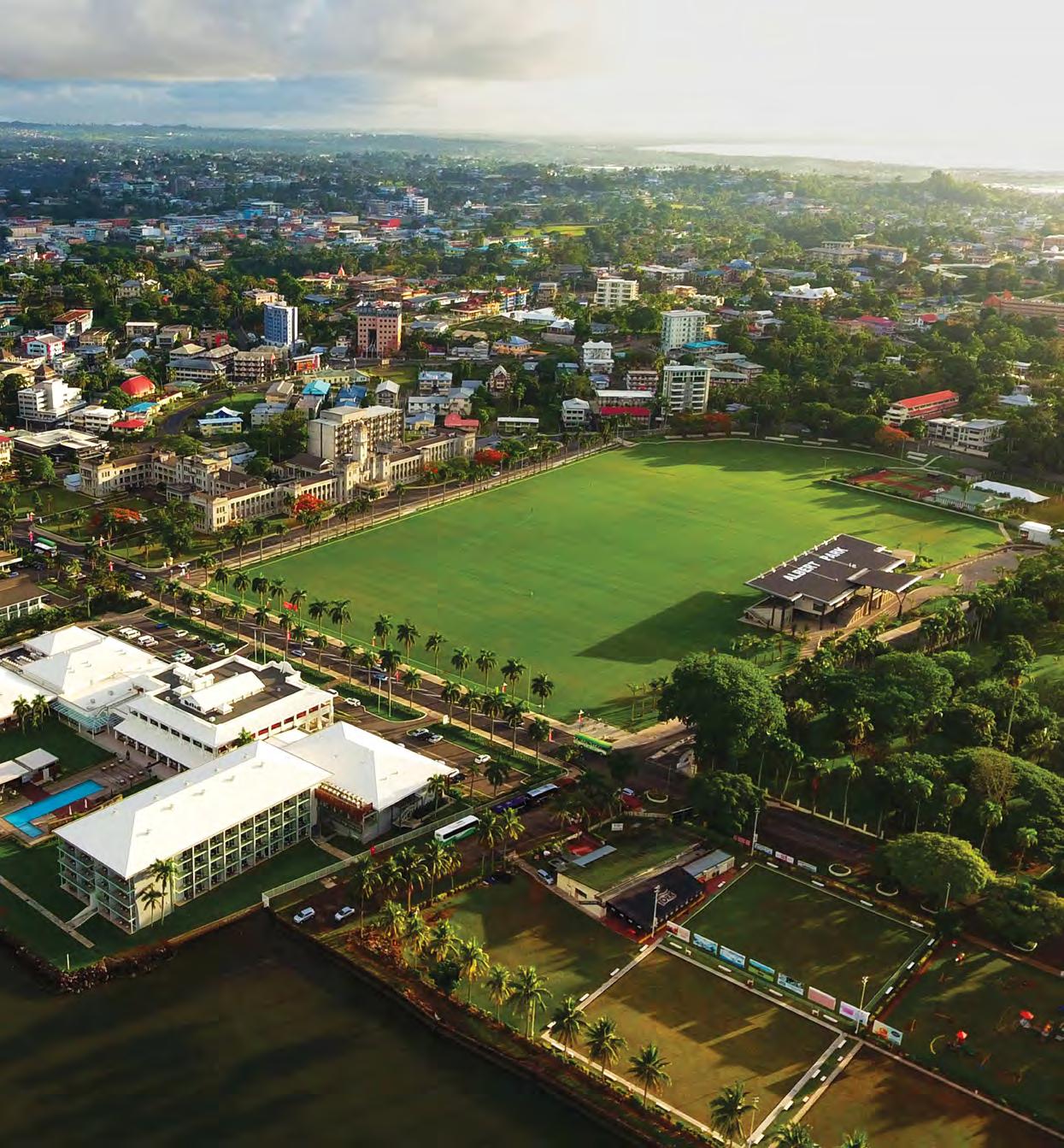
• Economic update
• Exclusive interviews
• Market trends and insights
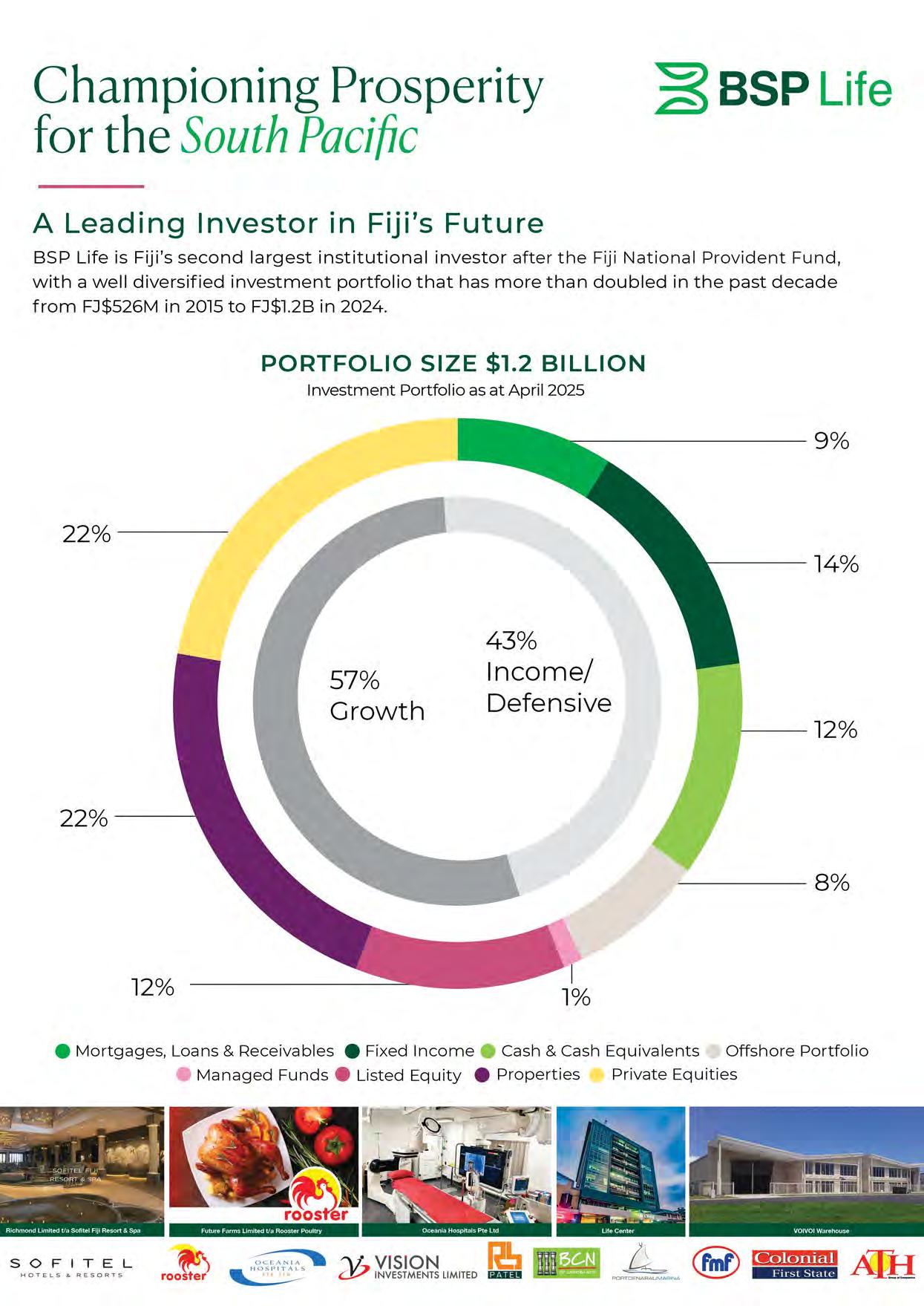


• Economic update
• Exclusive interviews
• Market trends and insights

Welcome to Business Advantage Fiji , a new business and investment guide to the Pacific Islands’ keystone economy.
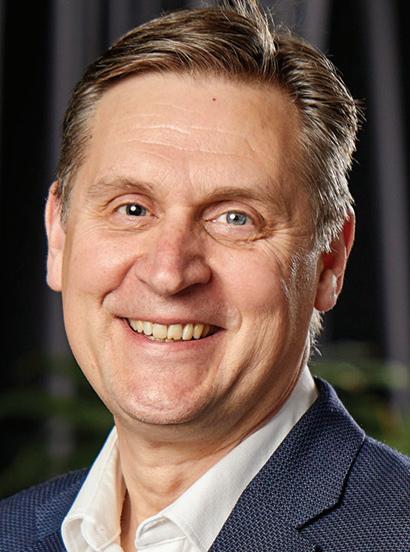
Business Advantage International (BAI) has been publishing business and investment intelligence and hosting events on Asia-Pacific economies since 2005.
These days, BAI is best known for our work in the neighbouring Pacific economy of Papua New Guinea but our first ever publication was actually on Fiji back in 2005.
A combination of factors have led us to focus again on Fiji.
Firstly, Fiji has rebounded strongly since the COVID-19 pandemic brought its tourism sector – the mainstay of its economy – to a standstill in 2020. In December 2021, Fiji was one of the first tourism markets in the world to reopen and it has grown its tourism arrivals steadily since – from half a million in that first year to over a million in 2024.
Such volumes have driven a consequent surge of domestic and international investment in Fiji’s tourism sector to address capacity constraints and upgrade properties. They have also encouraged Fiji’s government to pursue policies that will, over time, diversify its economy and improve the ease of doing business.
As a result, business and investment opportunities are emerging across several sectors, including agriculture, manufacturing, infrastructure and services.
Secondly, Fiji is strengthening its position as a hub for the Pacific. This has traditionally been the case in shipping, aviation and logistics, but now it is also the case in telecommunications, professional services, finance, investment, education, health and even labour.
All this means Fiji now offers genuine opportunities for those looking to invest and build stronger connections in the Pacific. You’ll read about many of these opportunities in this publication.
As well as our publications, Business Advantage International convenes an annual investment conference, focused on PNG and the Pacific. In 2025, this will take place at the Brisbane Convention and Exhibition Centre, Brisbane, Australia on 11 and 12 August and there will be a special session at the conference on Fiji (for more, visit www.pnginvestmentconference.com).
Andrew Wilkins Publishing Director Business Advantage International
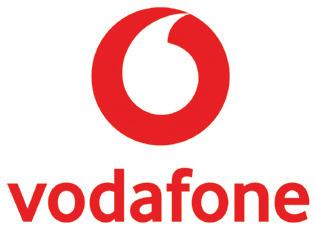

Aspen Medical is delivering world-class healthcare services to the people of Fiji
Masterplan to position Fiji as regional aviation hub
Leading Investor in Fiji’s Future second largest institutional investor after the Fiji National Provident Fund ,
to FJ$1.2B in 2024.
In partnership with the Fijian Government, we’re leading the transformation of public healthcare at Ba Hospital and Lautoka Hospital. Currently, Lautoka Hospital is undergoing a transformative $11 million upgrade, featuring a state-of-the-art Cath Lab, an advanced MRI suite and a modernised emergency department. This phase will be fully completed by 30 June 2025.

These enhancements underscore a dedicated commitment to providing




12 Perspectives
Business and government leaders share their insights and views on Fiji’s economy.
14 Fiji’s big three investors
We talk to Fiji’s largest institutional investors about their investment strategies and future projects.
20 Economic map of Fiji
25 Finance
After a difficult start, HFC Bank has become a Fiji banking success story.

26 Telecommunications
Fiji’s digital revolution continues, with more options for connectivity than ever before. Business Advantage Fiji looks at the new telecommunications landscape.
29 Services
Business process outsourcing is taking off in Fiji – we talk to one of the major players to discover why.
We talk directly to the experts sbout Fiji’s short-tomedium term prospects.

Key investors in Fiji’s largest economic sector provide their views on current business conditions and their exciting plans to develop the sector further.
Business Advantage Fiji 2025 Edition is published by Business Advantage International Pty Ltd Level 20, 31 Queen Street, Melbourne VIC, 3000 Australia Tel +61 3 8330 6081
Experts in publishing and marketing www.businessadvantageinternational.com
A digital edition of this publication is available free online at businessadvantagefiji.com. Additional printed copies can be purchased for A$50 (incl. GST and postage) from the above address or by emailing info@businessadvantageinternational.com.
© Copyright 2025 Business Advantage International Pty Ltd and contributors
ISSN 3083-5321 (print)/ ISSN 3083-533X (digital)
Printed in Australia. Both printer and paper manufacturer for this publication are accredited to ISO14001, the internationally recognised standard for environmental management. This publication is printed using vegetable inks and the stock is elemental chlorine free and manufactured using sustainable forestry practices.
30 Infrastructure and transport
Fiji’s role as a regional logistics and aviation hub continues to grow, as key service providers tell Business Advantage Fiji.
32 Retail
Family-owned Vinod Patel Group is one of Fiji’s most established retail/ wholesale businesses.
33 Healthcare
We look at a public-private partnership revolutionising health services in Fiji.
34 Manufacturing
Fiji’s natural artesian water has gone global and is set for further expansion.
36 Media
Media company
Communications Fiji has grown from humble beginnings to become a leader across the Pacific. We meet its co-founder.
37 Directory
Our guide to Fiji for the business traveller.
Advertising: Robert Milne (rm@businessadvantageinternational. com), Charles Saldanha, Kate Hammond
Commercial Director: Robert Hamilton-Jones (rhj@businessadvantageinternational.com)
Publishing Director: Andrew Wilkins (aw@businessadvantageinternational.com)
Senior Business Editor: Nadav Shemer Shlezinger (ns@businessadvantageinternational.com)
Editorial: Charlotte Armstrong, Paul Chai
Design: Alicia Freile
Cover image: Aerial view of Suva city, Fiji (Credit: Petersen Fotography)
DISCLAIMER Business

Fiji Airports Ltd is responsible for the operation of 15 public airports in the Fiji Islands, including Nadi International Airport, Fiji’s main international gateway, and Nausori Airport, Fiji’s domestic hub.
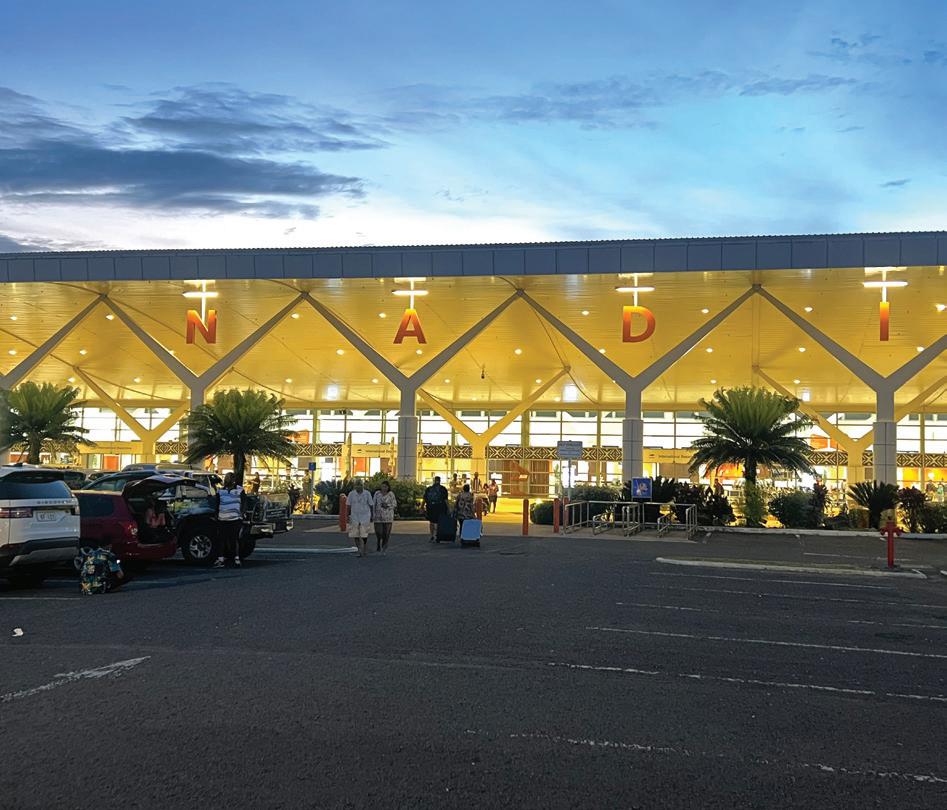
Tourist arrivals in Fiji are expected to double in the next decade and there is an urgent need to improve connectivity, passenger experience, and boost business travel.
In response Fiji Airports recently updated its 25-year masterplan, in order to significantly increase capacity and keep up to date with the latest technological advancements in air travel. The project will require a FJD$2.3 billion investment over a 10 year period and will position Fiji as the leading aviation hub in the South Pacific region.
The revised masterplan for Nadi Airport, Fiji’s main tourist entry point, was endorsed by the Prime Minister of Fiji last year and work is already underway. It will receive a series of key investments over the next five years, including a greatly expanded arrivals area. Other priorities include new aero bridges and scanners, as well as upgrading the baggage handling system. The new check-in system will provide self check-in kiosks and automated bag-drop, as well as biometric screening and eGates.
The masterplan also encompasses business travel. We have already spent FJD$64 million to upgrade the runway in Nausori, that serves the capital of Suva. We believe there is a huge opportunity to develop Nausori into a major business hub and send a strong signal that Fiji is open for business.
FIJI AIRPORTS LTD
Tel: +679 6725777
Mobile: +679 9927820
Facebook/LinkedIn/X: Fiji Airports
Email: info@fijiairports.com.fj www.airportsfiji.com

With its economy buoyed by a resurgent tourism sector, we talk to business leaders in Fiji about the opportunities that lie ahead for the Pacific Islands hub.
By Andrew Wilkins
Fiji in 2025 finds itself at the tail end of a strong fouryear economic rebound following the COVID-19 pandemic.
“Our economy grew by 19.5 per cent in 2022 and about 7.5 per cent in 2023,” explains Ariff Ali, Governor of the Reserve Bank of Fiji. “Growth in 2024 was 4 per cent, and, this year, we are looking at 3.2 per cent, which is back to our historical growth rate.”
Business conditions in the country are generally stable, with interest rates at historic lows and inflation also low.
While Fiji is an island archipelago, it is very much connected to the other key economies in the region in which it sits.
“A lot of Fiji’s economic drive is really generated by the wealth that sits outside of the country – either from tourists in nearby markets like Australia and New Zealand, or from citizens of Fiji who are working overseas and sending money back home,” observes Kishti Sen, Pacific Economist at the ANZ Bank. “So, if you want to say something about Fiji’s
future growth, you have to look at those markets where Fiji’s income is generated.”
These markets continue to be beneficial to Fiji. The country’s tourism sector attracted a record one million visitors in 2024 and is also tracking strongly in 2025. Tourism investors are now moving to address capacity issues – including an estimated 5000-key shortfall – that Ali sees as a one of the brakes on Fiji’s current economic growth (see page 17 for more on tourism development.)
While the international hotel brands in Fiji will be familiar to global travellers, the investors behind these developments are often local entities with diverse investments across Fiji’s economy. These include the country’s big three institutional investors: the Fiji National Provident Fund, Fijian Holdings and BSP Life (see page 14).
While tourism is Fiji’s dominant sector, it is by no means its only source of foreign income. The country has a track record of exporting sugar, vegetable and animal produce, garments, wood products, as well as gold from its two productive mines on its largest and most populous island, Viti Levu.
More recently, two lucrative new lines of business have emerged.
FIJI IS ON AN EXCITING, AMBITIOUS DIGITAL JOURNEY, ONE THAT IS FUELLED BY OUR UNWAVERING COMMITMENT TO INNOVATION, SOCIAL ECONOMIC GROWTH AND INCLUSIVITY.
The Hon. Manoa Kamikamica, Deputy Prime Minister and Minister for Communications
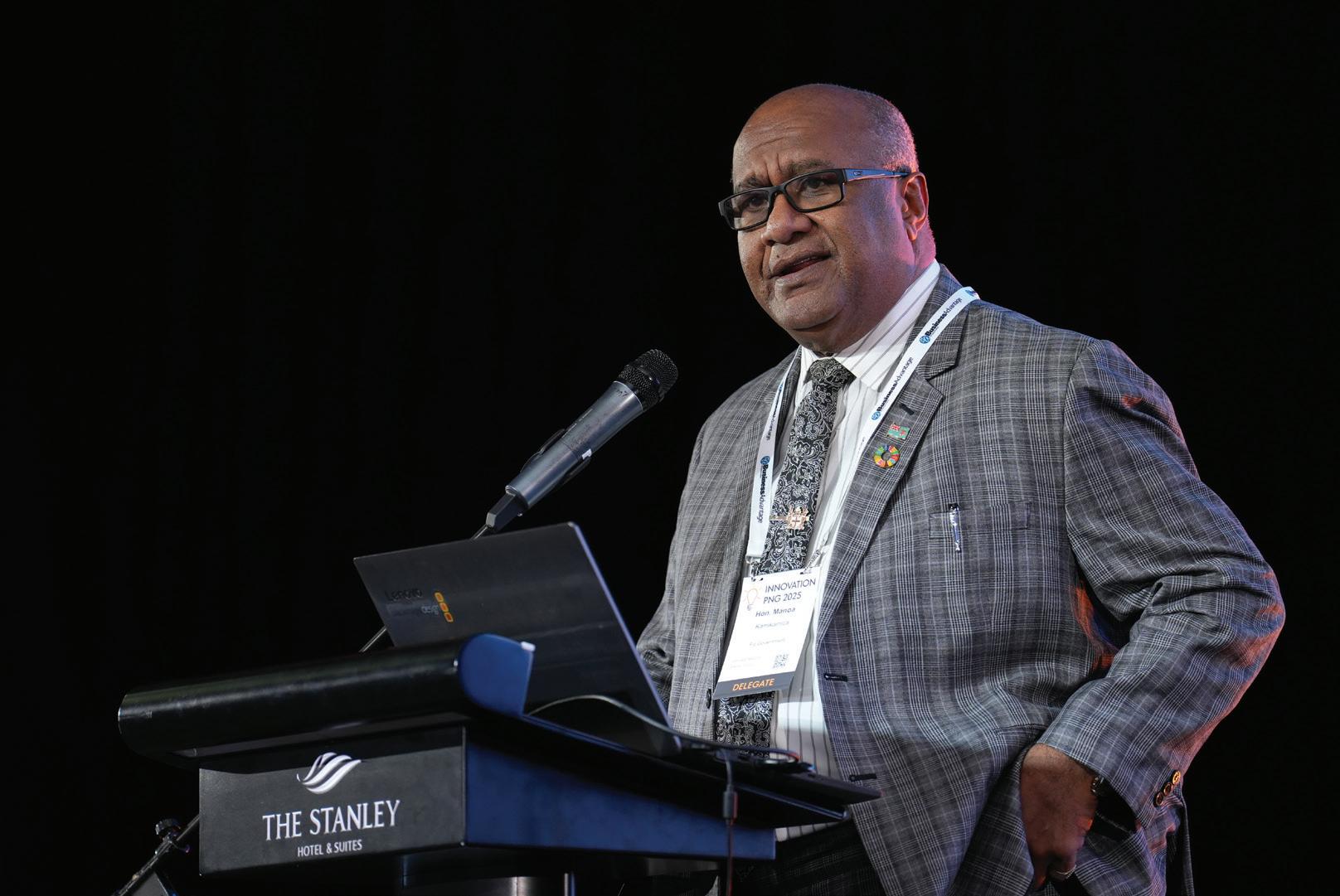
Mineral water is now Fiji’s biggest manufactured export, thanks in part to the success of the United States’ agricultural giant The Wonderful Company’s FIJI Water brand in the US market and the work of locally owned competitor, Pleass Global (see page 34). According to provisional Fiji Bureau of Statistics figures, mineral water accounted for 27 per cent of Fiji’s exports by value in 2024.
While the success of mineral water has been arguably built – in part – on Fiji’s reputation for having a pristine natural environment, its other recent success story has been built on its man-made advantages: an educated, English-speaking workforce and a robust telecommunications
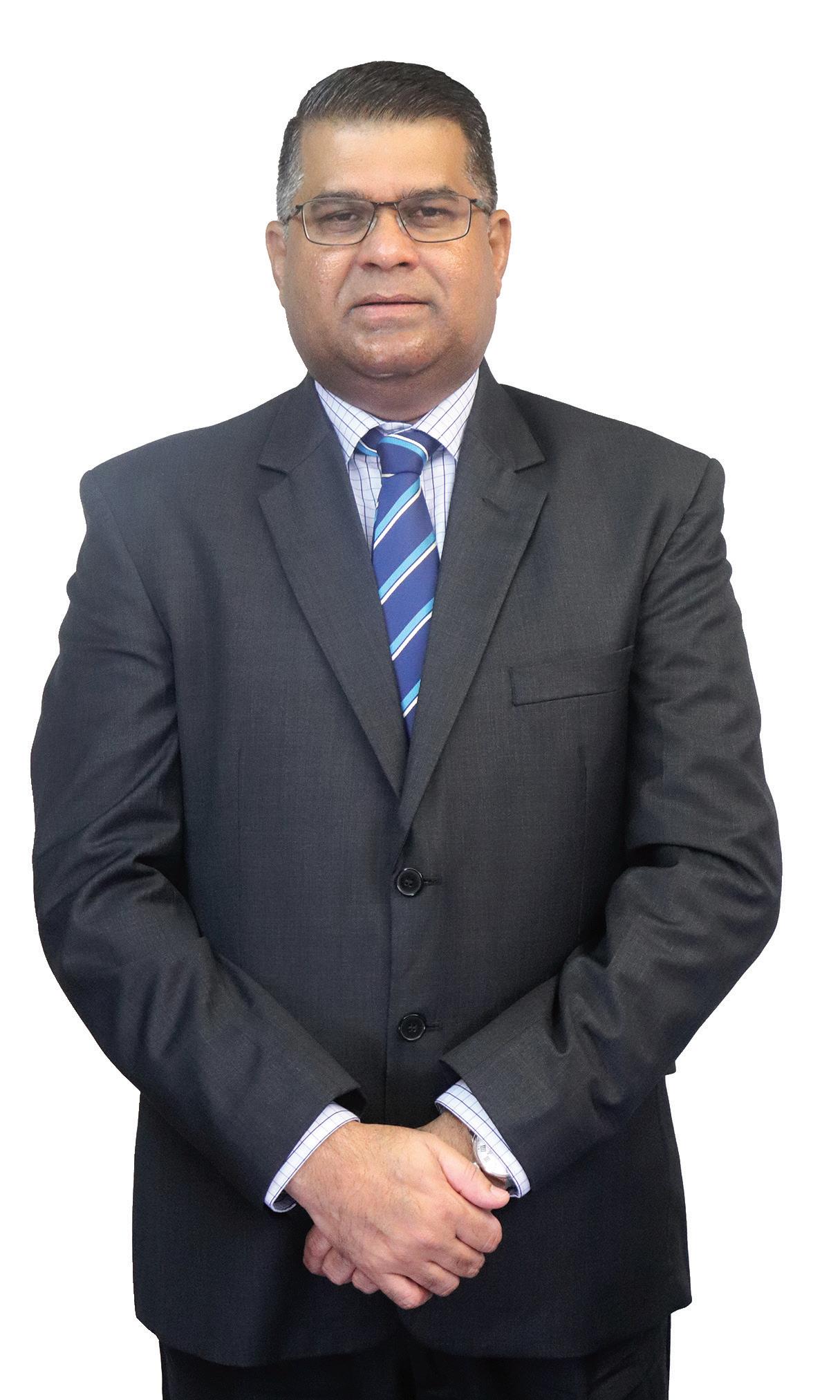
Since 2000, when Southern Cross undersea cable made internet connectivity affordable and reliable in Fiji (augmented in 2022 by Southern Cross NEXT), businesses have been able to use Fiji to support their back office processes.
“Of the just over 600 staff we have here in Fiji, I’d say the majority of them don’t just service this business, they also do work for
our other markets across the Pacific,” notes Rabih Yazbek, Country Head in Fiji for Australian bank, ANZ.
More recently, this has seen the development of a fullyfledged Business Process Outsourcing (BPO) sector under a peak body, Outsource Fiji.

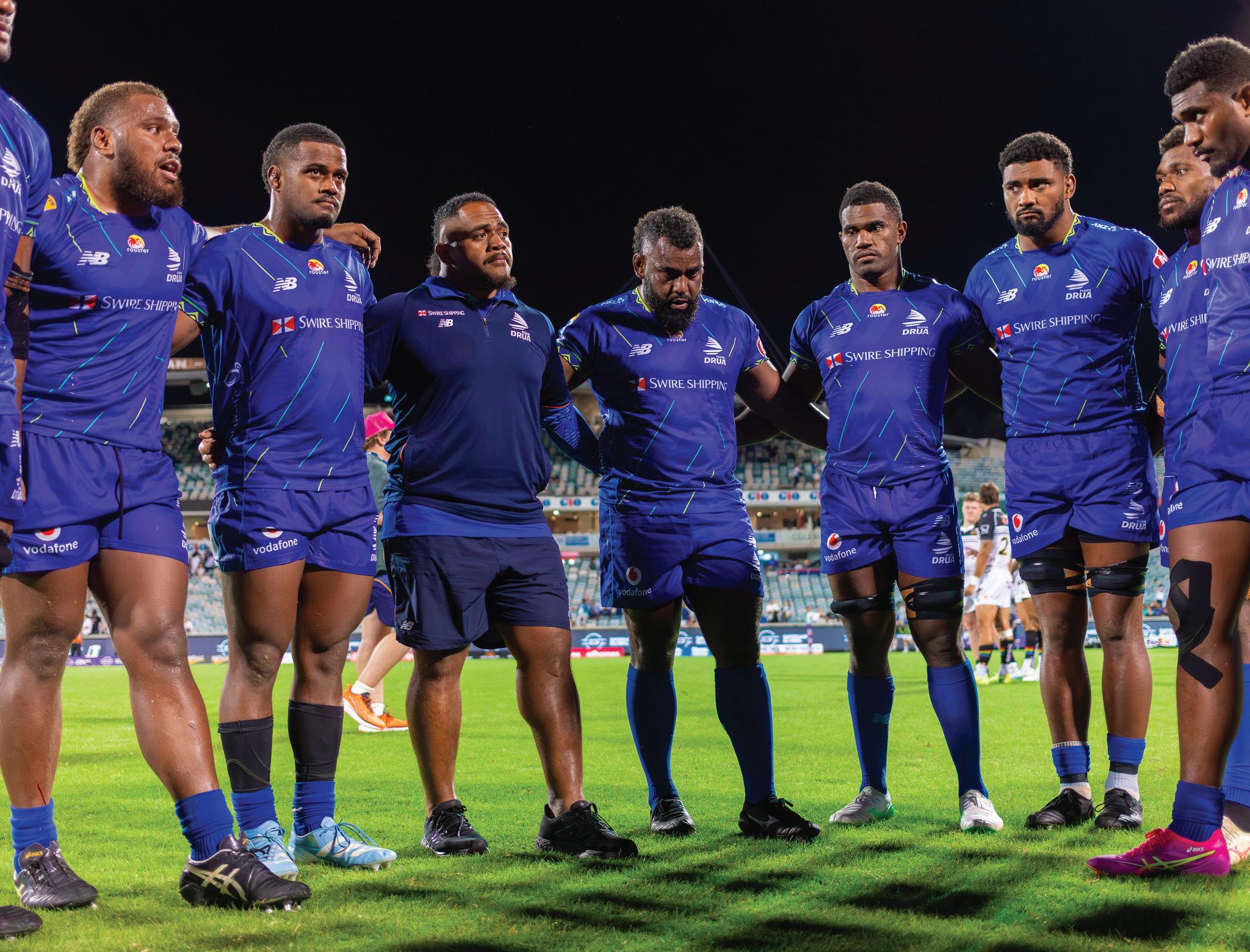
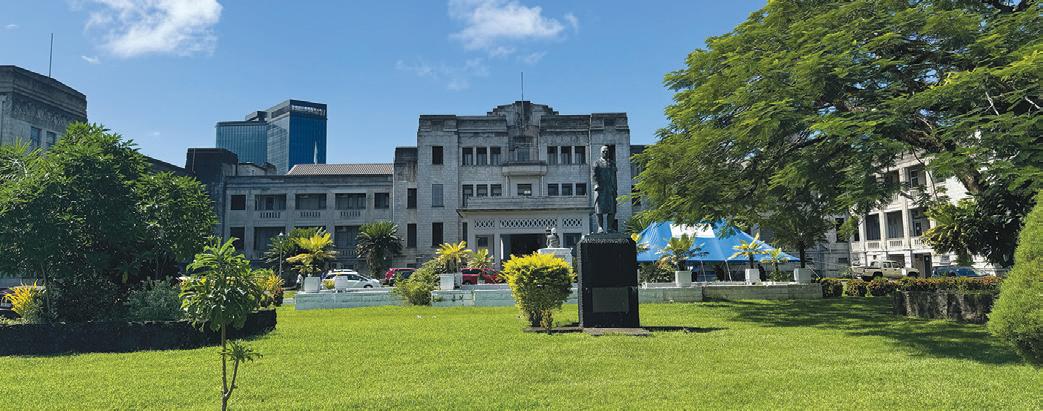
Population
900,869 (2025, Fiji Bureau of Statistics)
Capital Suva
Exclusive Economic Zone 1.26 million sq km
People iTaukei (native Fijian), Indo-Fijian and other
Time zone GMT + 12 hrs
Business languages English, Fijian and Hindi
Political status Parliamentary democracy
GDP US$6.26 billion (2025, IMF)
GDP growth 2.6 per cent (2025 forecast, IMF)
Inflation 3.2 per cent (2025 forecast, IMF)
Currency Fiji dollar (F$)
Major industrial sectors Tourism, agriculture, telecommunications, manufacturing, fisheries, forestry, coffee, retail/ wholesale, construction, business services
Exports Mineral water, sugar, vegetable products, gold, garments, seafood, wood products
Major export markets USA, Australia, Tonga, New Zealand, Samoa, Vanuatu
Imports Machinery and appliances, vehicles, fuel, prepared foods, animal products, vegetables, chemicals, plastics, textiles
Major import markets China, Australia, New Zealand, USA, Japan, India
Like Fiji’s celebrated national Rugby Union and Rugby Union Sevens teams, the Fijian Drua men’s and women’s rugby XVs are a further demonstration of Fiji’s ability to compete above its weight internationally. The Fiji Rugby Union (FRU) hailed the teams’ 2022 entry into the Pacific Super Rugby and Super W competitions – held against the top teams in Australia and New Zealand – as “one of the most exciting developments in the history of Fiji Rugby”. Both teams have proven hard to beat since, with the women’s team winning the competition in its first two seasons and the men’s team making the quarter-finals in 2023 and 2024. Credit: Fijian Drua
“We’ve had a lot of growth in the outsourcing sector,” Carol Watkins, CEO of one of Fiji’s largest BPO providers, Centrecom, tells Business Advantage Fiji. “During COVID, businesses that had outsourced to the Philippines started looking around to see what else was out there. They really liked the neutral English accent here and Fiji’s proximity to Australia and New Zealand. And then there’s our very high literacy rate here.”
The quality of education in Fiji means its BPO sector can handle higher value work, as Kamal Chetty, CEO of Investment Fiji (the government’s investment promotion agency), explains.
“Fiji’s BPO sector is not only call centres; it’s also knowledge process outsourcing. KPMG has got their artificial intelligence centre here. It’s also about cyber security and all those things.”
FIJI’S BPO SECTOR IS NOT ONLY CALL CENTRES; IT’S ALSO KNOWLEDGE PROCESS OUTSOURCING.
Kamal Chetty, CEO, Investment Fiji
We are more than a bank, we are your business partner. Someone who understands what it's like to operate on the ground in Fiji - yet with the global banking experience you need to grow your business and compete across the region and the world.
BSP is the South Pacific's International Bank, proudly headquartered in PNG and also operating in Fiji, the Cook Islands, Samoa, the Solomon Islands, Tonga and Vanuatu. We're already the bank of choice for many businesses across the Pacific - big and small. And we're investing in new digital capabilities to ensure our current and future business customers have international quality banking services, including online foreign exchange.
Whether you want to fund new assets or projects, improve payment efficiency, optimise your cash flow, transact internationally or support your employees with workplace banking - our relationship managers are here to help you.
Talk to us today about your business goals, our heritage, knowledge and footprint across the South Pacific to ensure we have your business as our priority.


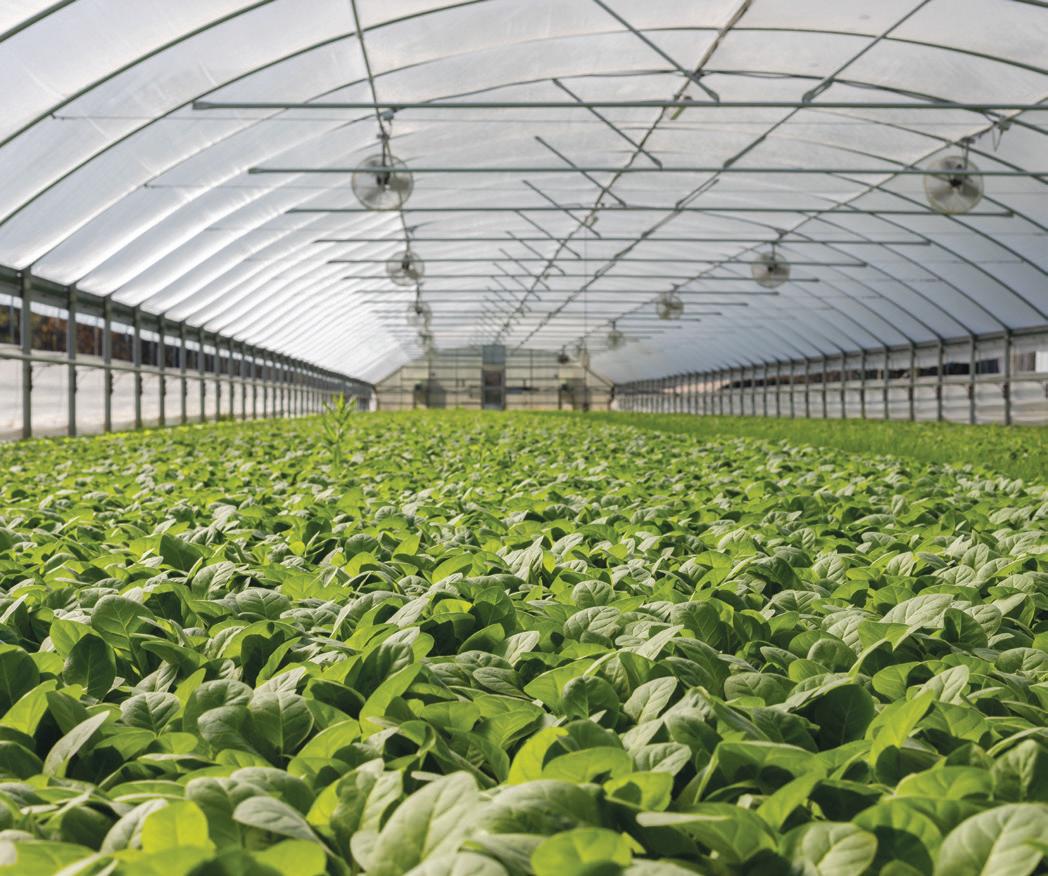
Far from standing still, Fiji’s telecommunications system continues to expand and improve on the back of some high profile new developments: notably, the entry of satellite provider Starlink into the market and the connection of Fiji to two new undersea fibre-optic cables owned by global tech giant Google (see page 26).
“Fiji is on an exciting, ambitious digital journey, one that is fuelled by our unwavering commitment to innovation, social economic growth and inclusivity,” says the Hon. Manoa Kamikamica, Deputy Prime Minister of Fiji and Minister for Communications.
“With the Google investments, we anticipate that it will create more than 3600 jobs by 2030 and contribute an estimated F$250 million to Fiji’s GDP.”
Infrastructure spend
Beyond telecommunications, infrastructure investment is also slated for other sectors.


“If you look around Fiji, the challenge to Fiji is old infrastructure, whether it’s the roads, hospitals or water. It’s at a stage now where you really need to take it to the next level,” observes Jaoji Koroi, Group CEO of Fijian Holdings, one of Fiji’s largest institutional investors.
Pursuant to the country’s National Development Plan, 2025–2029, there are already concrete plans to upgrade the country’s key airports (see page 31) and maritime ports, while the country’s energy provider, Energy Fiji Limited, is embarking on a ten-year journey to take the country from 46 per cent to 90 per cent renewables-generated electricity by 2035. This will require the commissioning of new solar, hydro and wind power plants, as well as F$700 million worth of upgrades to the country’s transmission system. Recent works have also upgraded the foreshore area of Fiji’s secondlargest port, Lautoka.
As the success of its tourism and BPO sectors demonstrates, one of Fiji’s major assets is its people.
However, with less than 60 per cent of jobs taking place in Fiji’s formal economy, moving overseas to work has been a
Fiji’s South Pacific Stock Exchange (SPX) is one of only two stock exchanges in the Pacific Islands region (the other being Papua New Guinea’s PNGX). Some 20 local companies are listed on the exchange.
The year 2024 saw the highest dividends in SPX’s history, in addition to capital gains of around five per cent.
“Last year, 16 out of the 20 companies paid dividends,” SPX’s CEO Sheraj Obeyesekere tells Business Advantage Fiji. “This demonstrates that the market delivers dual returns in the form of capital gains and also regular dividends, as Fijian companies have a culture of paying dividends.”
SPX is starting to see new listing activity. Locally owned Sun Insurance listed in August 2024, with a total of seven million shares snapped up quickly in an IPO. Sun Insurance’s outgoing Principal Officer Tarlochan Singh attributes the success of the listing to the company’s 25-year track record of consistent profitability and the ongoing strength of its investments in property development, which complement its core insurance business.
“We’ve seen Sun Insurance as a catalyst,” Obeyesekere tells Business Advantage Fiji. “We are looking at maybe three equity listings within the next 12-to-18 months.”
“Already we feel there’s a change at SPX,” agrees Griffon Emose, Managing Director of Kontiki Capital, one of the three licensed stockbrokers in Fiji. “If you can simplify trading and put it online, there’s a lot of pent-up demand from investors. It’s going to be huge.”

is held by institutional investors, so retail participation is fairly low, and retail investors are the ones that actually trade and foster liquidity,” explains Obeyesekere.
IF YOU CAN SIMPLIFY TRADING AND PUT IT ONLINE, THERE’S A LOT OF PENT-UP DEMAND FROM INVESTORS.
Griffon Emose, Managing Director of Kontiki Capital
While 2024 was also a record year for trading volumes on SPX, the number of trades was still modest.
“Ninety per cent of the market, in terms of holdings,
long-established and beneficial practice for Fijians, providing them with incomes that often return home in the form of remittances to family and friends.
Migration for work accelerated rapidly after COVID (in 2023, for instance, a net figure of some 46,000 citizens –around five per cent of the population – left the country), further encouraged by Australian and New Zealand government schemes aimed at attracting Pacific Islands workers.
While this migration has delivered an explosion in remittances – rising from F$500 million to F$1.2 billion annually – it has also resulted in a noticeable “brain drain”
While SPX is engaged in educational programs to encourage more local retail investors, the bigger opportunity is to attract more foreign investors, which currently represent just ten per cent of the exchange’s investor base.
“Over the next 10 years, the objective is to achieve a Frontier Market classification. That will be the game changer in terms of attracting foreign funds to Fiji,” says Obeyesekere.
This may require the Pacific’s two stock exchanges to present themselves as a single market. Pacific Capital Markets Development, owner of PNGX, acquired a strategic 12.5 per cent of SPX in 2023 in part to explore this opportunity.
locally, which has left the country’s employers with some human resource challenges.
The words of Rahul Amin, CEO of retail, construction and tourism conglomerate, the Vinod Patel Group, are typical of many of the employers we spoke to for this publication.
“It affects us in a big way. It’s becoming harder and harder to get people to assist in our growth plans.”
While larger businesses have their own internal training programs, and are in some cases bringing in foreign labour, Fiji’s government is also focused on addressing the current skills gap.
We project that the economy will continue to grow and we are in sync with the Reserve Bank’s projections.
Tourism will really remain the key GDP driver for 2025. The other thing that has kept our economy quite buoyant and also has contributed towards our foreign reserves is inward remittances.
Business and government leaders provide their personal takes on Fiji’s economy.

Outside tourism and remittances, the other key areas are forestry, gold and the export of fish. Diversification outside tourism has to be a long-term goal.
Haroon Ali Country Head, BSP Financial Group (Fiji) Ltd
I think the Reserve Bank has done a fantastic job with Fiji’s economic recovery. Interest rates have never been this low and the Reserve Bank has pretty much aided in that positioning. As we get the economy going again, low interest rates actually help stimulate the economy.
The monetary policy position has been accommodative and measured – as Fijian banks, we can’t complain.
Shane Smith CEO, Westpac Fiji


As an asset finance business, we’ve grown alongside a strongperforming economy and on the back of tourism, which has a ripple effect and lifts businesses more broadly.

We’re quite optimistic that the economy will grow between three and four per cent per annum, which is enough for us to grow. There are also a number of investments in the pipeline for Fiji.

retail,
Kamal Chetty CEO, Investment Fiji
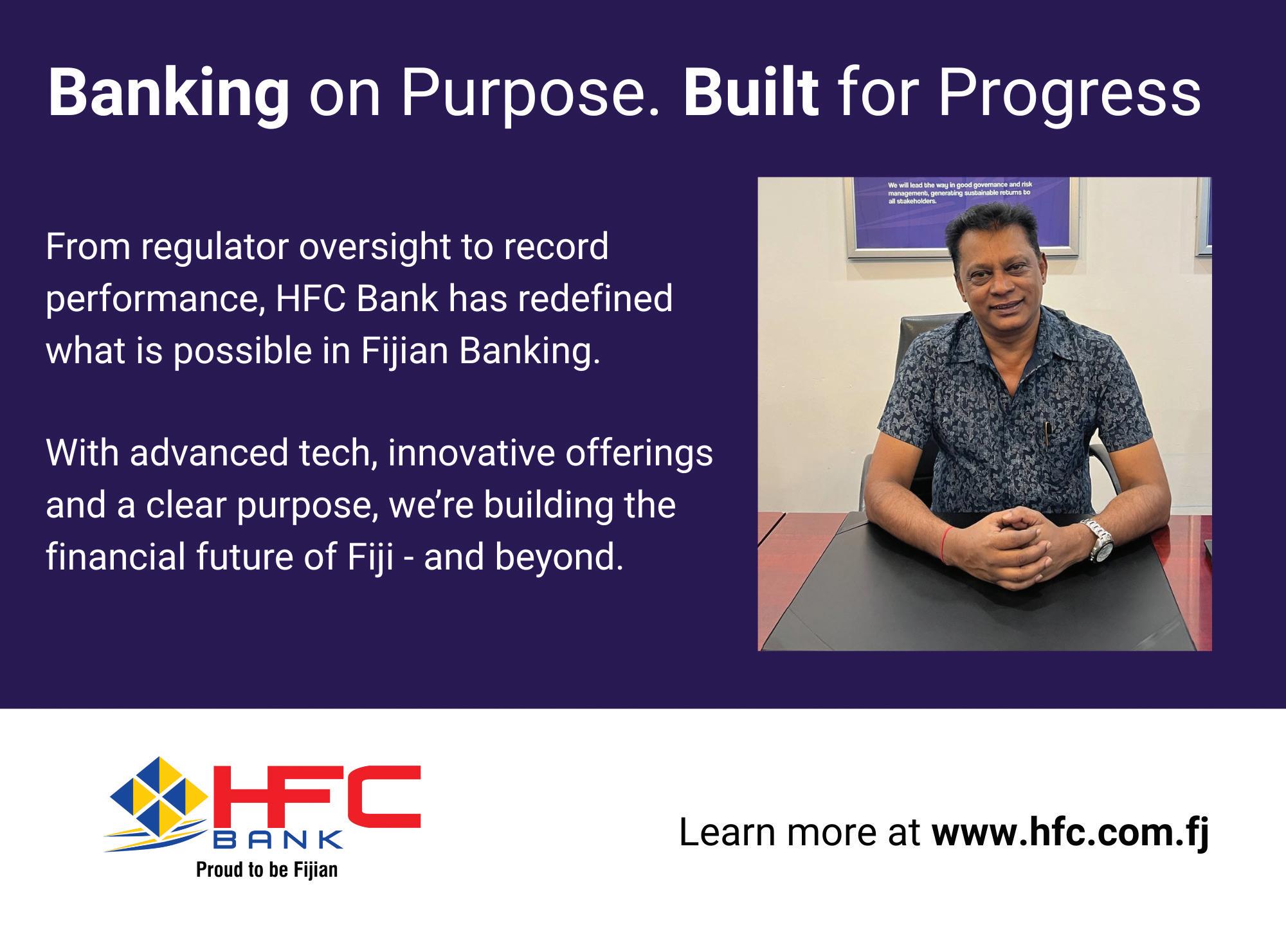
Amid the many investors actively involved in Fiji, three organisations stand out, both for the size and diversity of their investments and for their openness to partnerships. We talk to the heads of the Fiji National Provident Fund, Fijian Holdings and BSP Life to learn more about their investment approaches.
By Andrew Wilkins
Fiji’s largest investor is the country’s sole retirement savings fund, Fiji National Provident Fund (FNPF), which receives contributions from over 420,000 members annually.
In 2024, the fund delivered an 8 per cent return to members – its highest in 25 years, on the back of wellperforming listed and unlisted equity investments, solid returns from government securities and its investments in Fiji’s rebounding tourism sector.
“We run three funds, which run different balance sheets. Each of them has their own investment policy and governance,” FNPF’s Chief Executive Officer Viliame Vodonaivalu tells Business Advantage Fiji.
“In total, we have about F$900 million to invest every year. About 90 per cent our exposure is local.”
While almost three-quarters of its assets are in fixed income and equities, FNPF also has a sizeable property portfolio and is the country’s largest landlord. As well as notable tourism assets such as the currently renovating Westin Fiji, the InterContinental Fiji Golf Resort & Spa and Suva’s Grand Pacific Hotel, it also owns a sizeable bank of undeveloped land, including on Denarau Island.
Beyond tourism development (see page 22), Vodonaivalu sees

opportunities in infrastructure and also commercial property – a sector in which the fund made several acquisitions in 2024.
WE PREFER A PARTNER THAT IS ABLE TO RUN THE ORGANISATION. THE LESS WE GET INVOLVED, THE BETTER IT IS.
Viliame Vodonaivalu, FNPF’s Chief Executive Officer
‘The business process outsourcing sector is quite a sizeable space for us to move into – they’re desperate for more office space.”
Buoyed by the success of its catalytic investment in HFC, now Fiji’s thirdlargest bank (see page 25), the fund is exploring opportunities to grow fresh produce for the million hungry tourists that now visit Fiji annually.
“We’ve got synergies because we’ve already got seven hotels,” he notes. “Our philosophy is we are only for there for the profit-taking, so we prefer a partner that is able to run the organisation. The less we get involved, the better it is.”
Offshore, FNPF’s investments are mainly in managed funds but it is now also the second-largest shareholder in Papua New Guinea-headquartered regional bank, BSP Financial Group, having recently increased its stake to 11.4 per cent. FNPF also has exposure to PNG through Amalgamated Telecom Holdings, which launched Vodafone PNG there in 2022.
“The PNG market has always interested us due to its resources base. It’s going to grow and we should be there,” says Vodonaivalu.
Looking forward, Vodonaivalu would like to see more of the fund’s investments offshore, and is actively working to develop stronger ties with investment funds across the region through the Pacific Islands Investment Forum.
By Nadav Shemer Shlezinger
In a market where more than F$10 billion is held in retirement funds, BSP Life has carved out a niche by meeting demand from Fijians for near-term financial security.
Established in 1876 and rebranded by the BSP Financial Group in 2010 after acquiring it from the Commonwealth Bank of Australia, BSP Life is a leading Fijian insurer offering life and health insurance products.
Its life insurance products combine a savings and investment component with death and disability benefits — a model once common in Australia and New Zealand but now increasingly rare, according to Michael Nacola, Managing Director of BSP Life (pictured right).
“With a superannuation fund, you don’t touch most of your money until you retire. We complement what the Fiji National Provident Fund offers, which is long-term, with products that provide cash payouts in the shortto-medium term, wrapped with traditional life insurance benefits that provide needed financial support in the event of death or disability.”
Making a difference
BSP Life has enjoyed significant growth since 2010, when its premium income was F$45 million. It has since doubled to F$90 million in 2025. Over the same period, its assets under management have grown from F$350 million to F$1.2 billion.
“The investment portfolio has grown on the back of a growth in premiums that have enabled us to invest in a wide range of assets that also support the national economy,” Nacola notes. Just as importantly, customer payouts continue to grow year-on-year, hitting a high of F$99million in 2024.
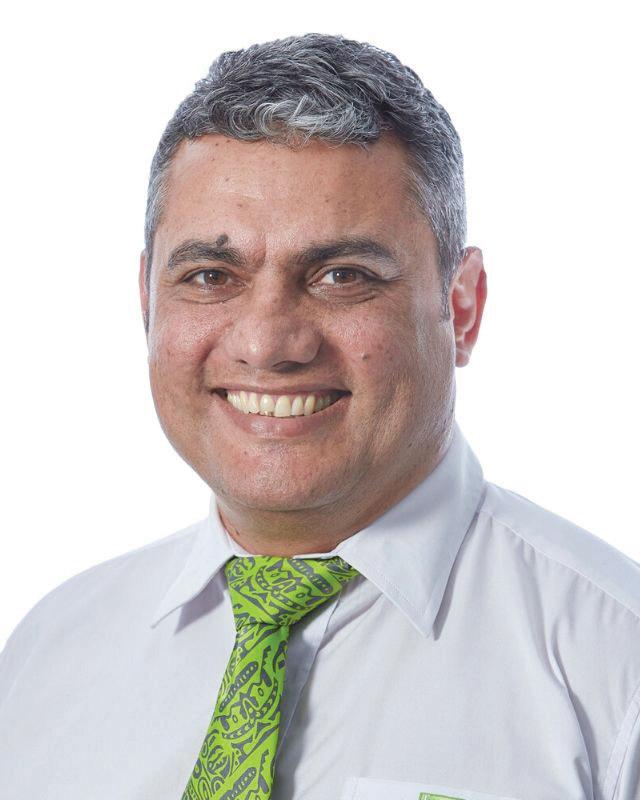
F$250 million luxury hotel (see page 24).
While tourism remains central, BSP Life is actively looking to diversify its portfolio through investments in sectors such as ICT, agriculture and mixed-use commercial-retail developments.
THE INVESTMENT PORTFOLIO HAS GROWN ON THE BACK OF A GROWTH IN PREMIUMS THAT HAVE ENABLED US TO INVEST IN A WIDE RANGE OF ASSETS.
Michael Nacola, Managing Director, BSP Life
“We’re always a life insurance company, first and foremost,’ Nacola says. ‘The investment instruments we delve into must always meet the criteria to deliver back on the dividends to shareholders and give customers bonuses.”
To this effect, the firm has developed a pipeline of investments with a six-year horizon — “a sweet spot” that balances its own liquidity requirements with the solvency requirements of the Reserve Bank of Fiji.
It is also looking at opportunities with prospective overseas partners.
“Can the foreign investment coupled with our equity, partnered with other local institutions, catalyse large developments that can support growth of our economy? Will these developments be sustainable so that they provide returns over the long-term? These are all critical considerations that drive our investment strategy,” Nacola tells Business Advantage Fiji
Fund name BSP Life
Year established 1876
Assets under management F$1.2 billion (2025)
Annual compounded growth 8.42% (2015–2024)
Number of policy holders 80,000
Notable assets Co-owner, Sofitel Resort & Spa and Vatu Talei Hotel, Future Farms Pte Ltd, Oceania Hospitals
By Andrew Wilkins
Investment fund Fijian Holdings was created with two specific purposes in mind: one financial and the other social.
“We were set up to accelerate the participation of the iTaukei [indigenous Fijians] in Fiji’s commercial sector,” explains Group Chief Executive Officer Jaoji Koroi. “So, apart from financial objectives, we have a very strong social objective.”
The fund is wholly owned by iTaukei, including several indigenous councils, boards and investment vehicles. Its two largest shareholders
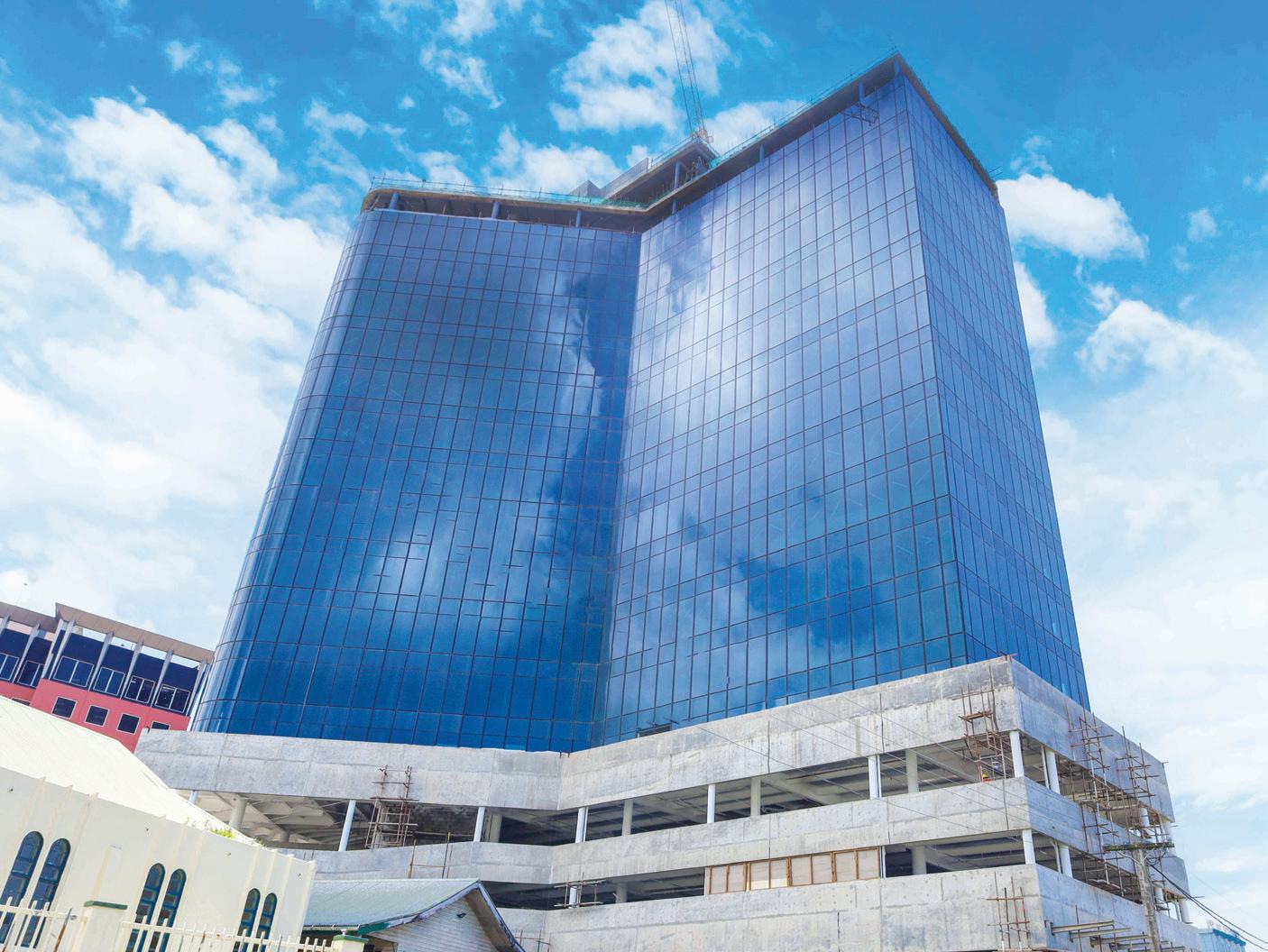
shareholders since it was created in 1984.
At the same time, the fund will continue to look for new investments.
WE’RE GOING TO REINVEST IN A LOT OF OUR EXISTING BUSINESSES TO GENERATE FUTURE VALUE.
Jaoji Koroi, Group Chief Executive Officer, Fijian Holdings
are the iTaukei Affairs Board and the iTaukei Trust Fund Board, which between them control over two-thirds of its shares.
Koroi says Fijian Holdings has delivered significant benefits to its
Fijian Holdings — key facts
“We have distributed close to five times the initial capital provided to us in dividends, and we’ve grown the value of the shares by about 10 times. So, if you are an original investor, you have multiplied your investment about 15 times.”
The fund’s portfolio of assets is diverse, across tourism, finance, retail, manufacturing, building services and media. After some post-COVID “housekeeping”, during which underperforming assets were sold off, Koroi says the fund is now pursuing a new investment strategy focused on three growth areas.
Firstly, he says, “we’re going to reinvest in a lot of our existing businesses to generate future value.” For example, tourism company South Sea Cruises Limited is going to receive new vessels, while its Pacific Cement business is getting an upgraded mill.
Finally, in what Koroi describes as “a new frontier for us,” the fund is looking to form joint ventures with iTaukei landowners.
“The model is a joint venture, where the landowners have a piece of land which is suitable for development — a property development or land subdivision, for example. That becomes their equity contribution into the joint venture, which we fund, and then we develop it together into a business.”
Koroi sees this type of investment, for which Fijian Holdings’ board is allocating 10 per cent of its capital, as not only unlocking the value of customarily held land but ensuring resource owners participate fairly in the economy. It’s also about capacity building in the iTaukei business community.
“We work with landowners and train them to become joint venture partners,” he says.
Fijian Holdings is also seeking partnerships to develop some of its key projects, in sectors such as forestry, construction and infrastructure.
“We have a strategic advantage in terms of looking at some of these things. Because we have a close relationship with the landowners, we can access land.”
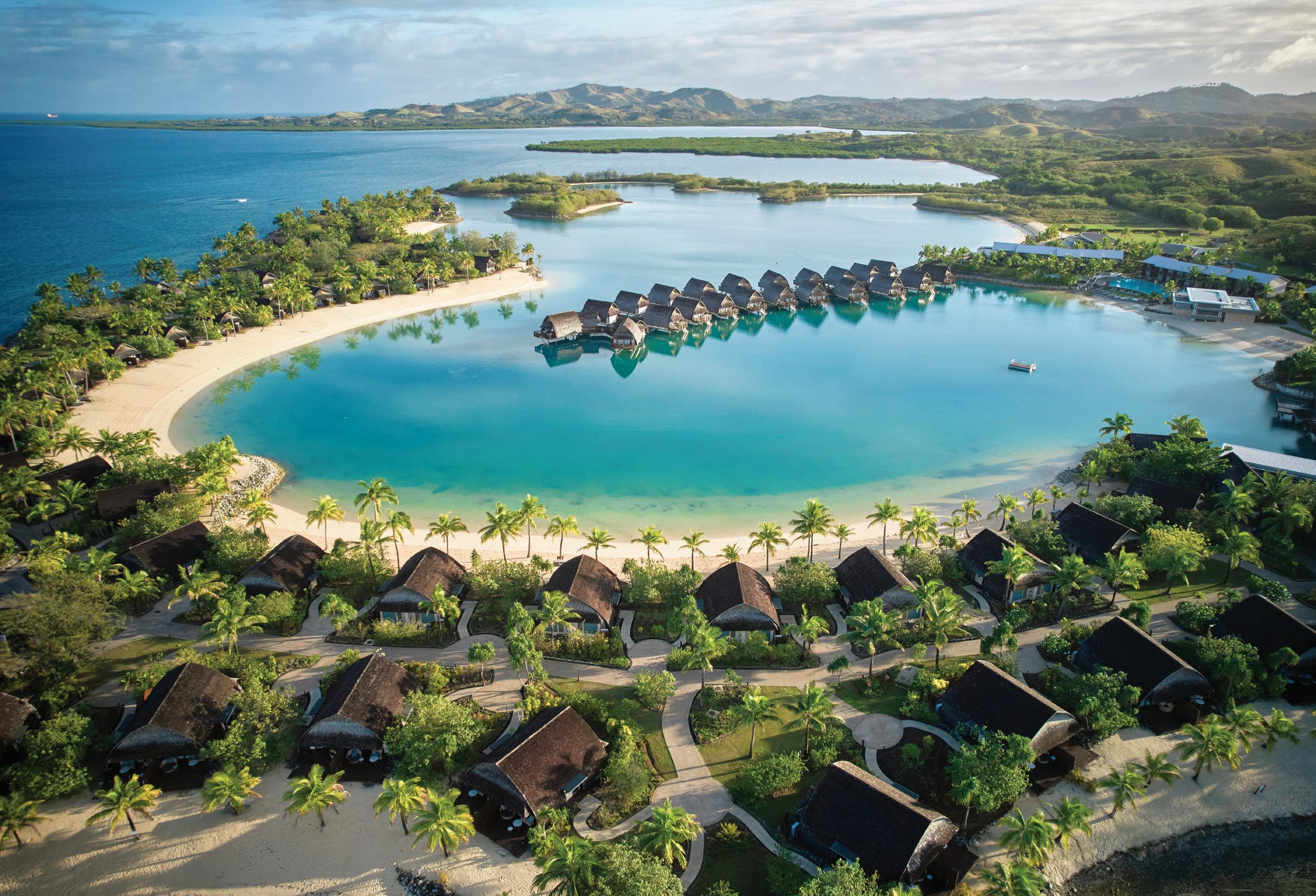
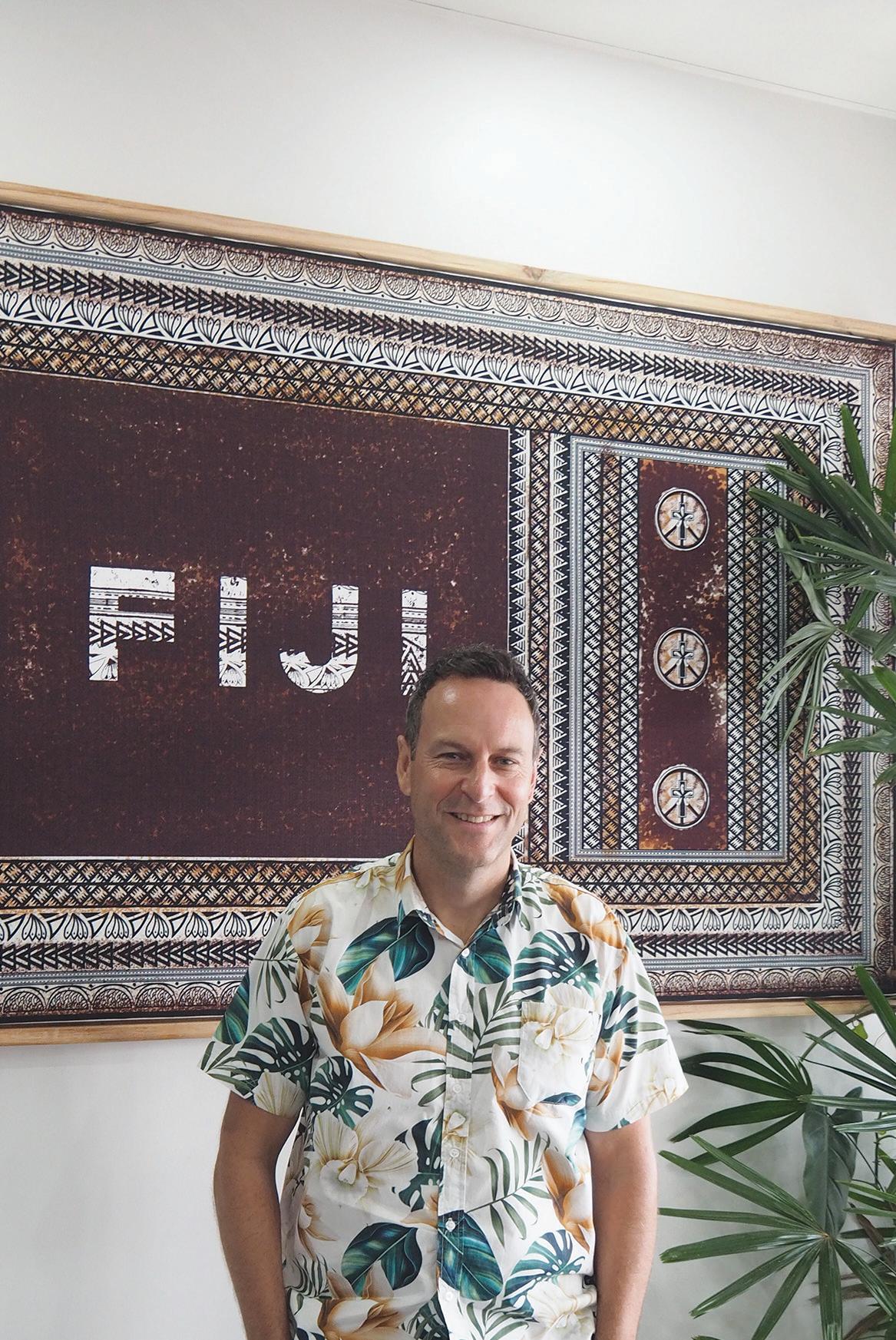
leaders that visitor arrivals were slightly down on the year before. Further enquiry, however, revealed a sector in excellent shape, facing relatively few headwinds and with a compelling growth strategy.
The year 2024 was a record one for the industry as a whole, with over a million visitor arrivals and robust profit margins.
“We are in an enviable position at the moment,” says Brent Hill, outgoing CEO of government agency Tourism Fiji. “We have really high occupancy rates and really high average daily room rates.”
Much has been made of Fiji’s lightning-quick reopening at the end of 2021, after its borders had been closed for 19 months due to COVID.
“We expected 30 per cent occupancy initially, but within three months were at 90 per cent,” says Vincent Macquet, Area General Manager of Accor Hotels Fiji.
While this campaign was an outstanding effort, both of marketing and logistics, it does not explain why the
WE ARE TARGETING WHAT WE CALL ‘CONTRIBUTING TOURISTS’: THOSE WHO ENGAGE WITH FIJI, TAKE PART IN THE CULTURE, ENGAGE IN A SUSTAINABILITY INITIATIVE, AND LEARN SOMETHING WHILE THEY ARE HERE.
Our future growth lies in the US market. It’s about 20 per cent of our market share but could be a lot more.
The previous air services agreement [between Fiji and the United States] was lopsided and restrictive, limiting us to codeshare services to Los Angeles, San Francisco and Honolulu. Now it’s been renegotiated and we’ve added Dallas, home of our partner American Airlines (AA). We’ve started with three flights per week but we’re hoping to expand to daily, or even more.
How? Because in March this year we became a full member of the One World Alliance [which
sector has remained so buoyant since.
According to Neeraj Chadha, Vice President Pacific Islands for Marriott International, the sector was just ready to go to the next level.
“Upon reopening, Fiji had several strategic advantages that elevated its position in the global tourism landscape. In addition to a wellexecuted reopening plan, many hotels –whether by design or fortunate timing – had recently completed renovations that significantly enhanced the standard of accommodation.”
“Another pivotal factor was the government’s support in rationalising import
includes not just AA, but other major global carriers such as Qantas, Qatar and Japan Airlines] and also joined AA’s loyalty program, AAdvantage. This has around 150 million members who can now redeem air miles on a holiday to Fiji. From their perspective, we are American Airlines.
The US is a premium market for Fiji, more profitable than, say, Australia or New Zealand, which have approximately 50 per cent and 10 per cent market share respectively.
We are not trying to attract the US tourists who go to Mexico but the ones who go to Hawaii and the Caribbean. Because, in Fiji, we are not targeting visitor arrivals anymore – we’re targeting high net spend.
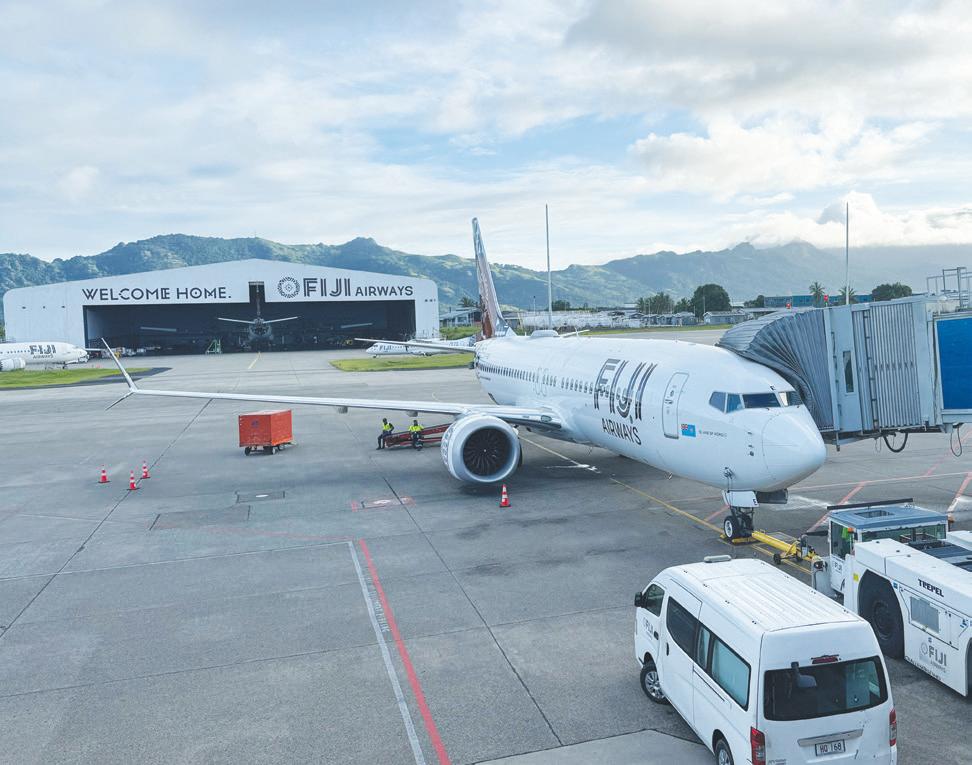


The most obvious answer is adding more room inventory to meet current demand. As the article that follows explains, this is not simply more of the same kind of rooms but also alternative configurations that appeal to new market segments – such as luxury (i.e. beyond five star) and self-catering units that are suitable for longer stays.
If it takes years to build a new resort, extra flights to new or existing markets can be added quickly.
The head of tourism’s peak private sector body talks to Business Advantage Fiji about the future of the country’s thriving tourism industry and how legislation needs to keep pace.
Tourism has very deep penetration into almost every area in the country. When tourism is successful, the Fijian economy grows.
There is a lot of construction underway in the sector. We have Vatu Talei on Denarau Island, Wyndham Gardens in Nadi, and the Rydges Wailoaloa resort by Hari Puja & Sons. There will also be a Radisson Blu Mirage Resort, the Fiji Naisoso Island scheduled to open in 2026, the Hilton Garden Inn in Suva from Carpenters Properties, and the first Ramada Encore in Fiji.
But the growth goes beyond new hotel openings.
Fiji Airways, our national airline, is looking to grow its reach. It has interest from China and from India. It has just joined the One World Alliance loyalty program, so that gives it a lot of flexibility in terms of passenger connections and its foray into Dallas gives us better access to the US market.
There are also a number of key tourism trends that Fiji is
There are certainly high hopes in the industry for the next phase of Fiji Airways’ North American strategy, which is based on an innovative partnership with the world’s largest airline, American Airlines (see box on page 18).
As the sector evolves, it is also focused on giving visitors more choice.
“[Our message is that] Fiji is not just beaches and resorts, it’s also hinterland experiences, cultural experiences and even whitewater rafting and ziplines through jungle,” enthuses Brent Hill.
perfectly placed to capitalise on. Visitors want authentic connections with nature and local communities and they are looking for true sustainability when they travel. We’re finding that visitors really want to be part of the sustainability discussion and that’s going to grow over the next 10 years.
We work closely with the Ministry of Tourism on what we
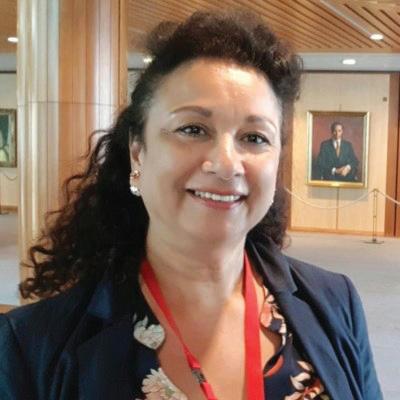
call the National Sustainable Tourism Framework. In this framework, we’ve identified that there are places where Fiji needs to grow tourism but there are also places that we feel have enough, such as Nadi. The country recently announced the Na Vualiku (or “Look North”) project to focus tourism growth in the country’s north.
TOURISM IS AN INDUSTRY THAT MOVES VERY, VERY QUICKLY TO EMBRACE GLOBAL PRACTICES, WHETHER THESE ARE SUSTAINABILITY, HR, GOVERNANCE, IT OR MARKETING.
Fantasha Lockington, CEO, Fiji Hotel and Tourism Association (FHTA)
“We are targeting what we call ‘contributing tourists’: those who engage with Fiji, take part in the culture, engage in sustainability initiatives, and learn something while they are here.”
“The growth in experiential tourism is one of the biggest trends in the global leisure market,” adds Accor’s Vincent Macquet. “We need to create [even] more reasons to come to Fiji.”
Another segment with lots of growth potential is MICE (Meetings,
One challenge we face is helping government legislation keep pace with all this change. Tourism is an industry that moves very, very quickly to embrace global practices.
We have a good rapport with government agencies. We have to explain to them that we sell Fiji because it’s naturally laidback, warm and welcoming. But, when it comes to business, we have to flip that to make sure that we’re getting efficiency and productivity. And that’s a very hard mix to get right.
Incentives, Conference and Exhibitions).
“The MICE segment is critical for our seasonality,” says Neeraj Chadha. “With its enhanced infrastructure, high quality accommodation, staging technology, improved international air connectivity and customisable daily program, Fiji offers a compelling environment for business events.”
“Destinations like Denarau Island, where we have three of our five properties, and the Coral Coast can cater to larger group sizes.”
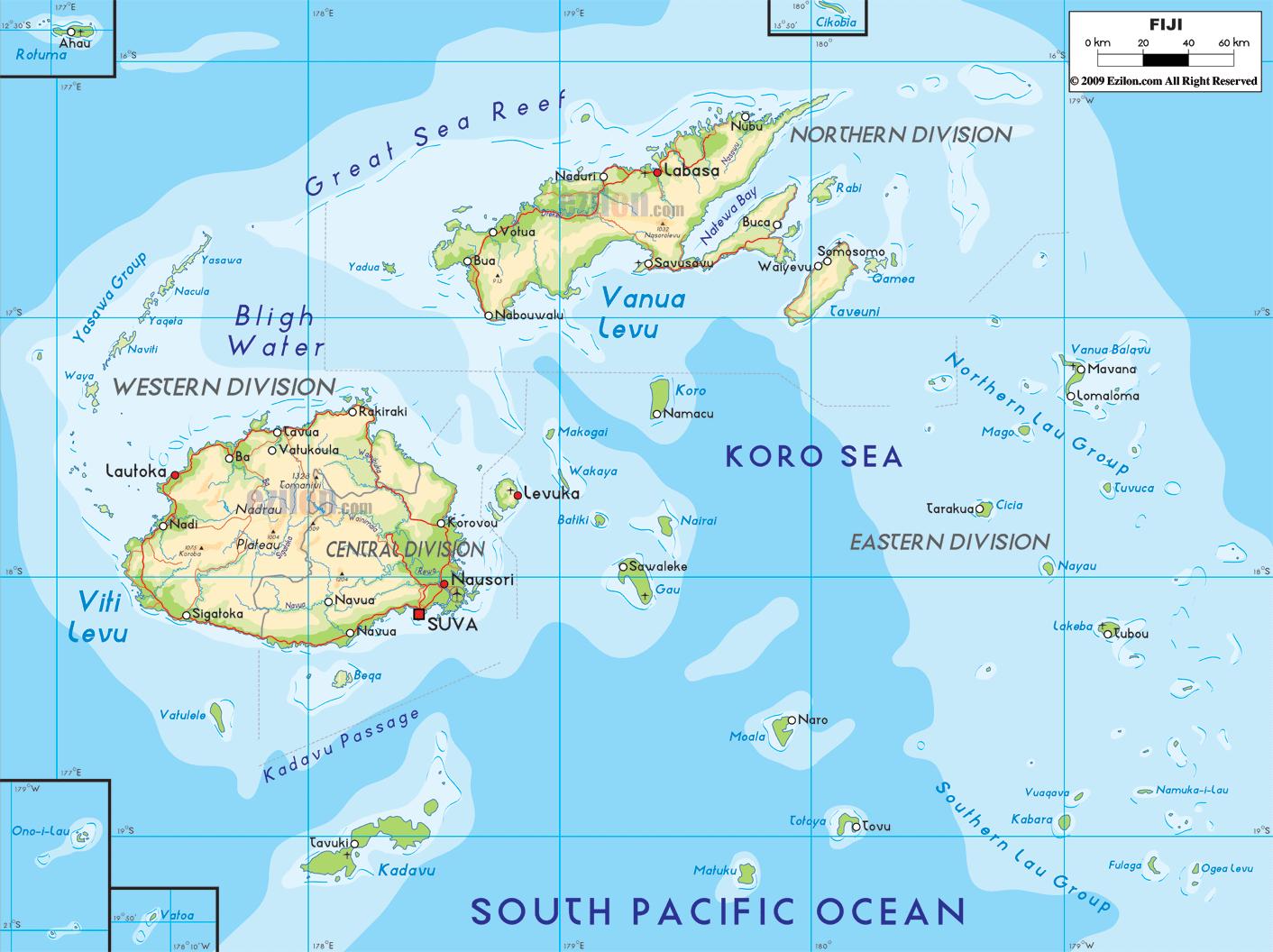

Infrastructure
Port Airport
Main roads
Electricity infrastructure
Wind power station
Diesel/Thermal power station
Hydro power station
Solar power station
Transmission lines
Mining projects
Iron sands mine
Gold mine
Primary production
Livestock
Sugar cane
Fisheries
Forestry
Coffee
Manufacturing
Undersea fibre optic cables
Bulikula (Google, 2026)
ICN1 (2014)
Gondwana-2 (2022)
Southern Cross NEXT (2022)
Tui Samoa (2018)
Southern Cross Cable Network (2000)
Tabua (Google, 2026)
Tonga Cable (2013)
(GOOGLE, 2026)
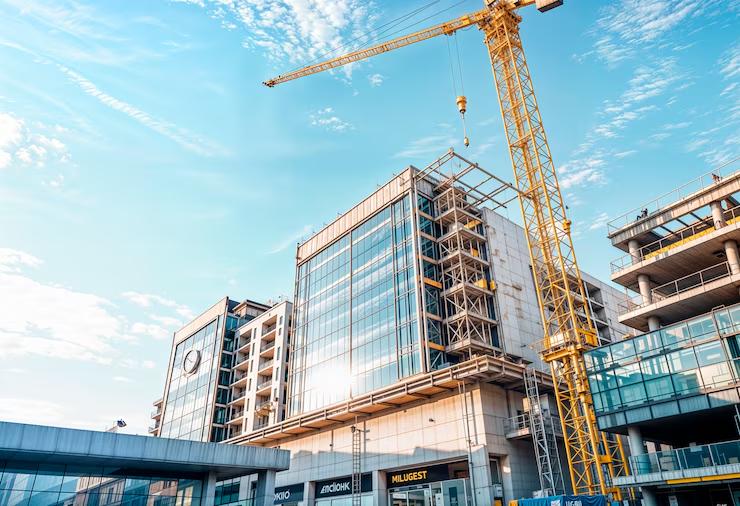

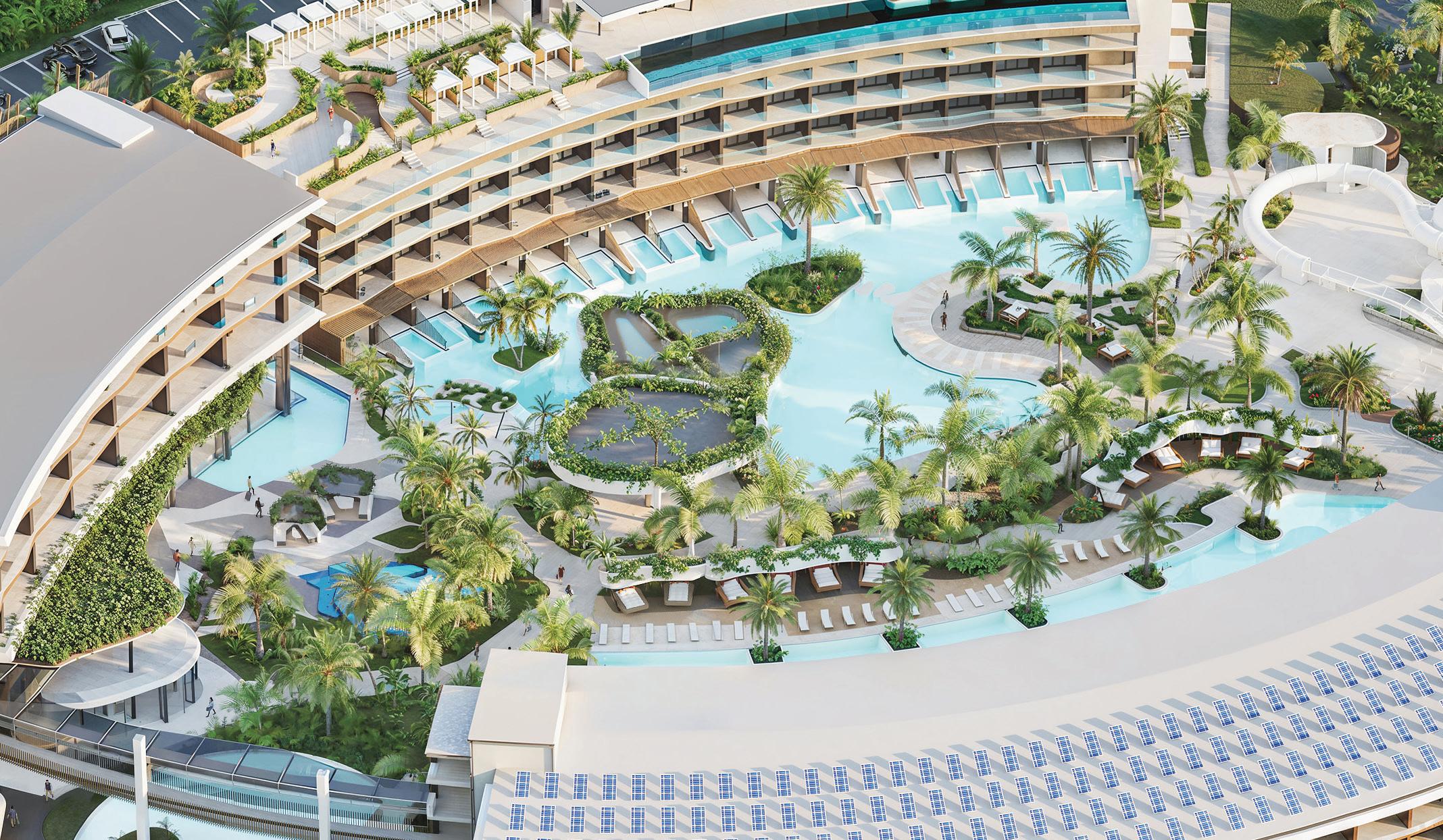
Investors in Fiji’s tourism sector are building and upgrading properties to meet anticipated demand. Business Advantage Fiji talks to industry insiders to find out more.
By Robert Hamilton-Jones
“If you own a hotel in Fiji, you are doing really well,” observes the outgoing CEO of Tourism Fiji, Brent Hill. As such, it is no surprise that many hotel owners are reinvesting, leading to an unprecedented surge in construction activity throughout the country.
One project in particular is aiming to reframe the image of Fiji as a tourist destination. Vatu Talei (or ‘The Jewel’) is under construction adjacent to the Sofitel on Denarau Island (see page 24).
There are also major works going on next door, where the Westin Fiji Golf Resort & Spa is due to open in early 2026.
“The renovated Westin is going to be a gamechanger for Fiji, raising the
bar in terms of customer experience,”
Neeraj Chadha, Vice President Pacific Islands for Marriott International, tells Business Advantage Fiji. “It will provide excellent accommodation and outstanding investment in public areas, including a fabulous Japanese-Peruvian beachside restaurant, while still retaining Fiji’s quintessential charm.”
With Denarau Island close to capacity, the Wailoaloa Bay area, close to Fiji’s main international airport at Nadi, is emerging as a new tourism hub.
The Wyndham Garden Resort opened in late 2023, while IHG’s sprawling Crowne Plaza Fiji Nadi Bay opened with over 300 rooms last year (on the site of the former and smaller Pullman Nadi Bay).
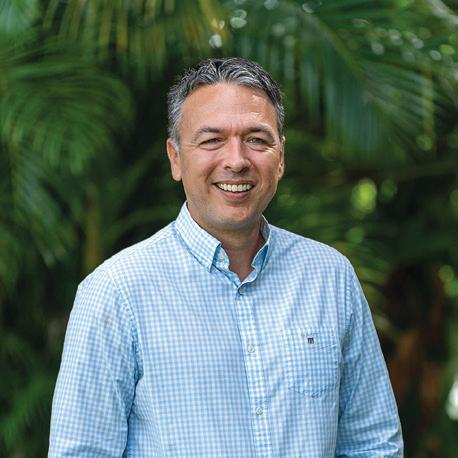
Finally, one of Fiji’s bestknown entrepreneurs, Hari Punja, is behind the Rydges Wailoaloa, a ‘new build’ beachfront resort
HOW OFTEN DO YOU HEAR OF A HOTEL DEVELOPER WORKING ON FOUR SEPARATE PROJECTS AT ONCE?
Vincent
that will open in late 2026.
Meanwhile, on nearby Naisoso Island, Radisson Blu Mirage Resort will comprise 144 beachfront apartments and its own marina. Funded by the Fiji National Provident Fund and BSP Financial Group (Fiji), it is expected to open in 2027.
Another international operator with a strong presence in Fiji is Hilton Hotels. Besides its signature Hilton Fiji Beach Resort on Denarau (which can accommodate over 1000 guests), it also runs the DoubleTree by Hilton Resort – Sonaisali Island.
Hilton’s long-term commitment to Fiji’s tourism growth is best reflected in the debut of the Hilton Garden Inn brand in the country – a milestone development in the middle of the national capital and business hub, Suva.


Where pristine beaches, world-class facilities, and genuine Fijian hospitality create the ideal setting for seamless business travel, inspiring conferences and retreats, or extending your stay to enjoy sun-drenched afternoons, vibrant coral reefs, locally-inspired cuisine, and authentic island experiences across our portfolio of four Marriott International Hotels in Fiji.
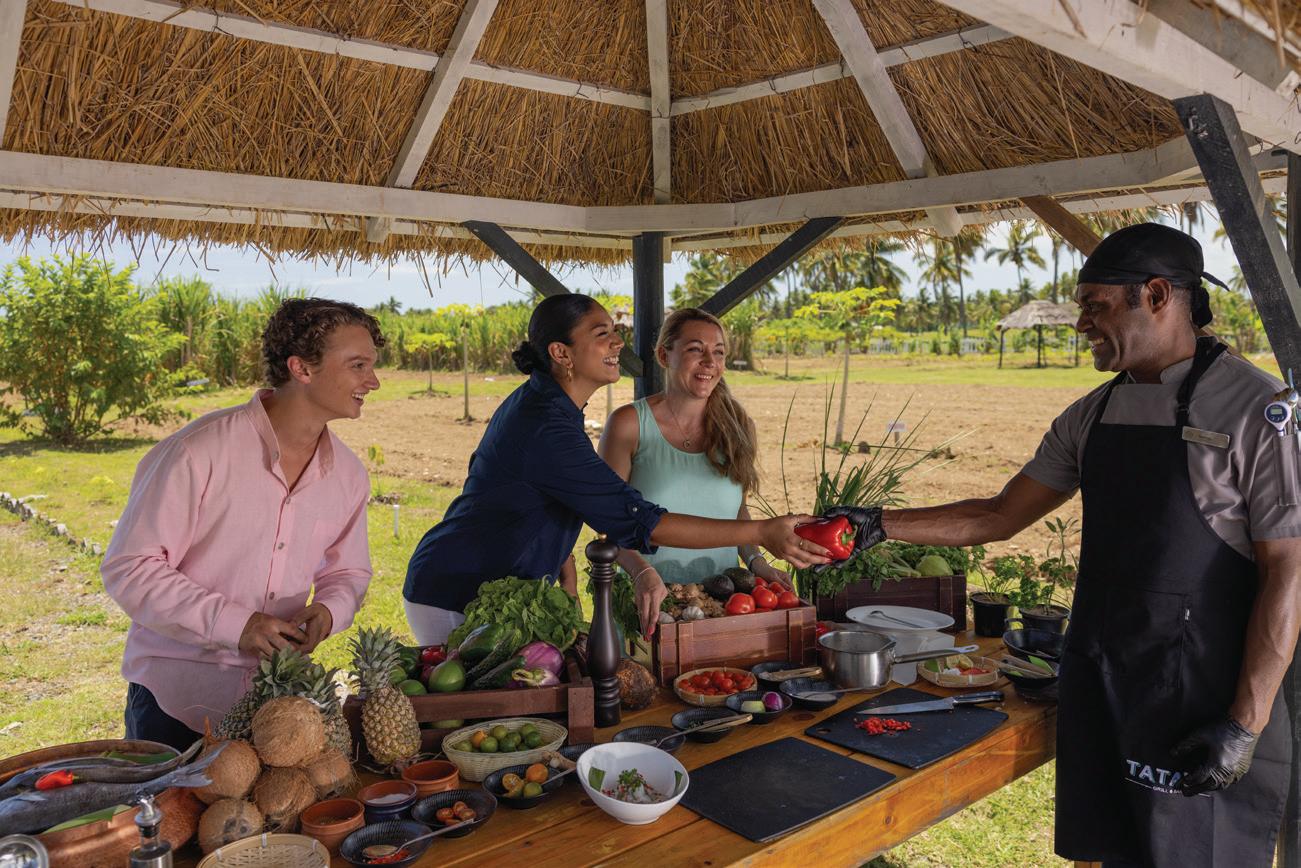
enquiries, please email
Scheduled to open next year, the brand new property is being funded by the Carpenters Group (a local subsidiary of Malaysian conglomerate MBf) to the tune of F$75 million.
“There is currently a supply issue with hotel rooms in Suva,” notes Carey Osborne, General Manager for Hilton in Fiji. “With 178 rooms, this will be the largest property in town and will cater to the corporate traveller, with super-fast wifi and other elevated touches in a great location.”
Stage two of the development will be a retail precinct set to transform Suva’s downtown waterfront. Meanwhile, Suva’s iconic Grand Pacific Hotel (built in 1914) will be rebranded as an Intercontinental in 2026.
Kamal Chetty, CEO of Investment Fiji, explains that some of this new wave of investment is also reaching some less developed parts of the country:
“In Rakiraki [in the north of Viti Levu], the 100-room Wananavu Resort is being built by Rups, a local investor. And two new hotels are being planned in Lautoka, which doesn’t usually see a lot of activity.
“We’ve also got some hotels being developed on Vanua Levu, plus a few in the [outer] islands, primarily with an eco-focus.”
This geographical dispersion is likely to increase given the significant upgrades planned for Fiji’s airport infrastructure (see page 31).
“Realistically, there are probably 1500 [rooms] that are either…starting soon, or already underway,” sums up ANZ Country Head, Rabih Yazbek. Even that, he thinks, is unlikely to be sufficient to meet future demand.
It is no surprise, therefore, that the next phase of projects is already on the drawing board.
“We’re not stopping at The Jewel,” says Vincent Macquet, Area General Manager for Accor Hotels Fiji. “We are planning a four star, mid-to-long-stay resort in Wailoaloa and a four-star hotel in Denarau. We are also involved in a four-star hotel project on the Coral Coast, bringing our total investment to F$475 million. How often do you hear of a hotel developer working on four separate projects at once?”
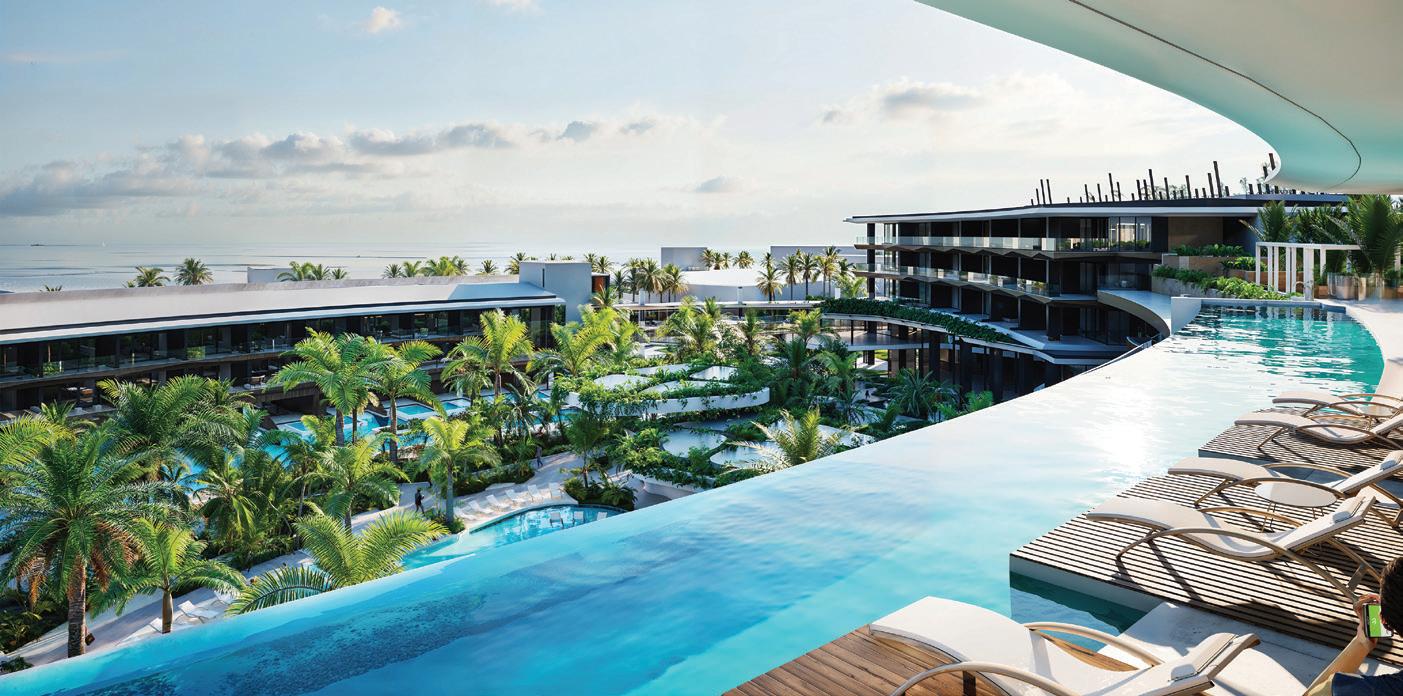
“We believe that Vatu Talei (‘The Jewel’) will redefine the luxury hospitality segment for Fiji tourism. It will essentially be a new blueprint for the industry,” says Vincent Macquet, Area General Manager for Accor Hotels Fiji.
The F$250 million property will feature 127 opulent hotel rooms, 30 two-bedroom apartments, and 18 exclusive penthouse residences. It will boast the region’s largest swimming pool, a lazy river, waterslides, swim-up bars, and a spectacular infinity rooftop pool.
The project is being developed by the same investors behind the Sofitel (Richmond Ltd, co-owned by BSP Life and Fiji Airways) on an adjacent 10-acre block. Construction started in mid-2024 and the resort is scheduled for soft opening in December 2026.
“It’s another level up from the Sofitel and will complement our existing hospitality offering,’ says Michael Nacola, Chairman of
Richmond Ltd. “As shareholders whose purpose is vested in Fiji, we wanted to do something special for Fijian tourism to cater to a more discerning clientele, aligned with Fiji Airways’ expansion into longhaul markets. The Jewel also offers guests from traditional markets like Australia and New Zealand a new offering.”
“The resort will offer a boutique experience and not just for couples. The room types will allow you to fit a family into a single unit of two or three bedrooms which is also perfect for inter-generational travel. It also integrates seamlessly with the Sofitel.”
“Richmond Limited is renowned as being a catalyst for development in Fiji. We see the same with the Jewel and hope that more high-end resorts will follow, providing more options to our discerning tourists, create jobs for locals, and grow the industry further.”

Fiji’s only locally owned commercial bank has engineered a dramatic turnaround. CEO Rakesh Ram reveals what has propelled HFC Bank to the top tier of Fiji’s financial system, and what’s next.
By Andrew Wilkins
When Rakesh Ram took the helm of HFC Bank in 2018, the institution was under intense scrutiny, not only from its regulator but the Fijian public in general.
“As the only Fijian bank, the bank faced the lingering stigma of the failed National Bank of Fiji,” the straighttalking banking executive recalls. What followed is a Pacific success story: a faltering domestic lender transformed into one of Fiji’s top three commercial banks and poised for expansion.
Founded in 1962 as Home Finance Company Limited, HFC rebranded in 2014 and transformed into a full-service commercial bank with the support of its co-owners, the Fiji National Provident Fund (75 per cent shareholder) and the Unit Trust of Fiji (25 per cent).
However, its early entry in Fiji’s competitive banking sector was not that easy or successful.
“When HFC Bank went live, it was under immense competitive pressure from the other established overseas-

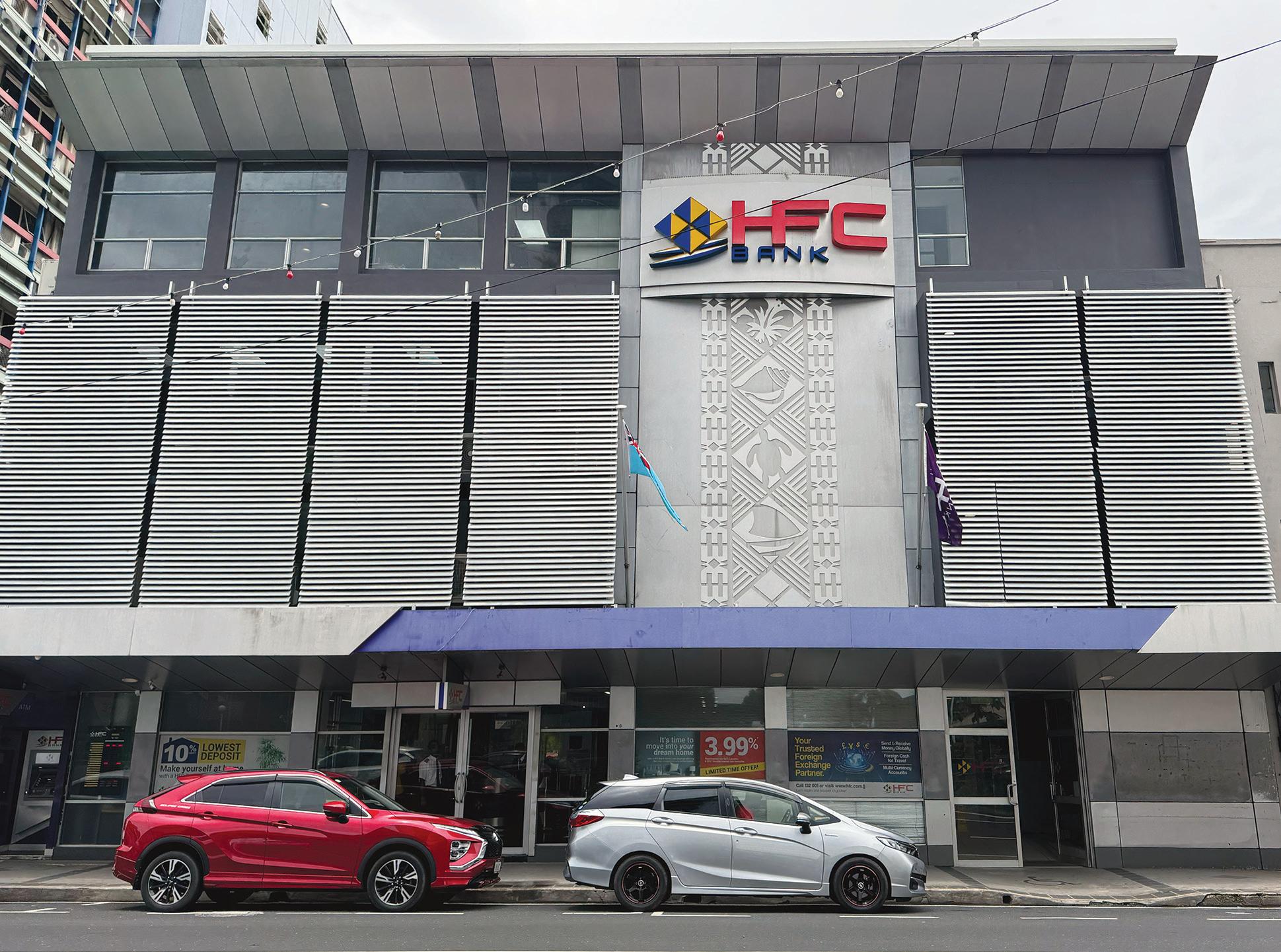
based commercial banks,” Ram tells Business Advantage Fiji. “You can’t expect to compete with such strong international banks overnight.”
“The first thing I did was to redefine our values,” he says. The acronym HEART – Humility, Excellence, Accountability, Respect, and Trust – became HFC Bank’s cultural foundation. “We weren’t going to win with size or global reach. But we could win with purpose.”
Results soon followed. The bank’s loan book surged from F$400 million to F$1.6 billion, and audited net profit after tax climbed from F$3 million to over F$40 million.
“We’re now standing shoulder to shoulder with international commercial banks,” says Ram. “And our ambition is clear: to become one of Fiji’s financial pillars by being a bank of choice for the Fijian people.”
This turnaround has been bolstered by a recent F$40 million investment in a new core banking platform.
Developed with India’s tech giant
Tata Consultancy Services, the system enables digital onboarding, online banking, and new services for smalland medium-sized enterprises (SMEs).
“It’s about accessibility and security,” says Ram. “We’ve built the infrastructure to grow without bricks and mortar.”
Diaspora banking is also a notable innovation. HFC Bank now opens accounts remotely for many of the large number of Fijians living and working overseas.
Strategically, HFC is pursuing balance. Today, 60 per cent of its portfolio is in corporate lending, but Ram wants to grow its SME and retail segments.
A partnership with the New Zealand Government-supported Business Link Pacific program provides equity support and partial loan guarantees for small businesses, without compromising credit discipline.
“I am proud that, despite being the youngest player in the market, we have changed the banking philosophy in Fiji,” Ram concludes. “People were hungry for a better banking proposition. We gave them one.”
Fiji’s digital revolution continues, with more options for connectivity than ever before. Business Advantage Fiji looks at the new telecommunications landscape, and how the operators plan to make all the new pieces fit together.
By Paul Chai
Fiji’s telecommunications industry is highly competitive, led by mobile operators Vodafone Fiji and Digicel Fiji, with Fiji International Telecommunications Limited (FINTEL) managing international gateways and Telecom Fiji focusing on landlines.
One of the biggest new developments in the market is Google’s South Pacific Connect initiative, which is delivering a number of new cables into Fiji – Bulikula (linking Fiji’s outer islands) and Tabua (linking Fiji with the US and Australia).
In addition to these services, Telecom Fiji and Google have committed to utilise terrestrial fibre optic cable to connect FINTEL’s international cable landing station in Vatuwaqa to Google’s ICT facility in Natadola.
New players, new opportunities
“Our digital transformation has also provided the right environment to better harness the opportunities of new and emerging technologies like artificial intelligence, and how we can use these technologies to solve current challenges in healthcare, education, maritime disaster preparedness and response, and cyber resilience,” observes Deputy Prime Minister and Minister for Communications, the Hon. Manoa Kamikamica.
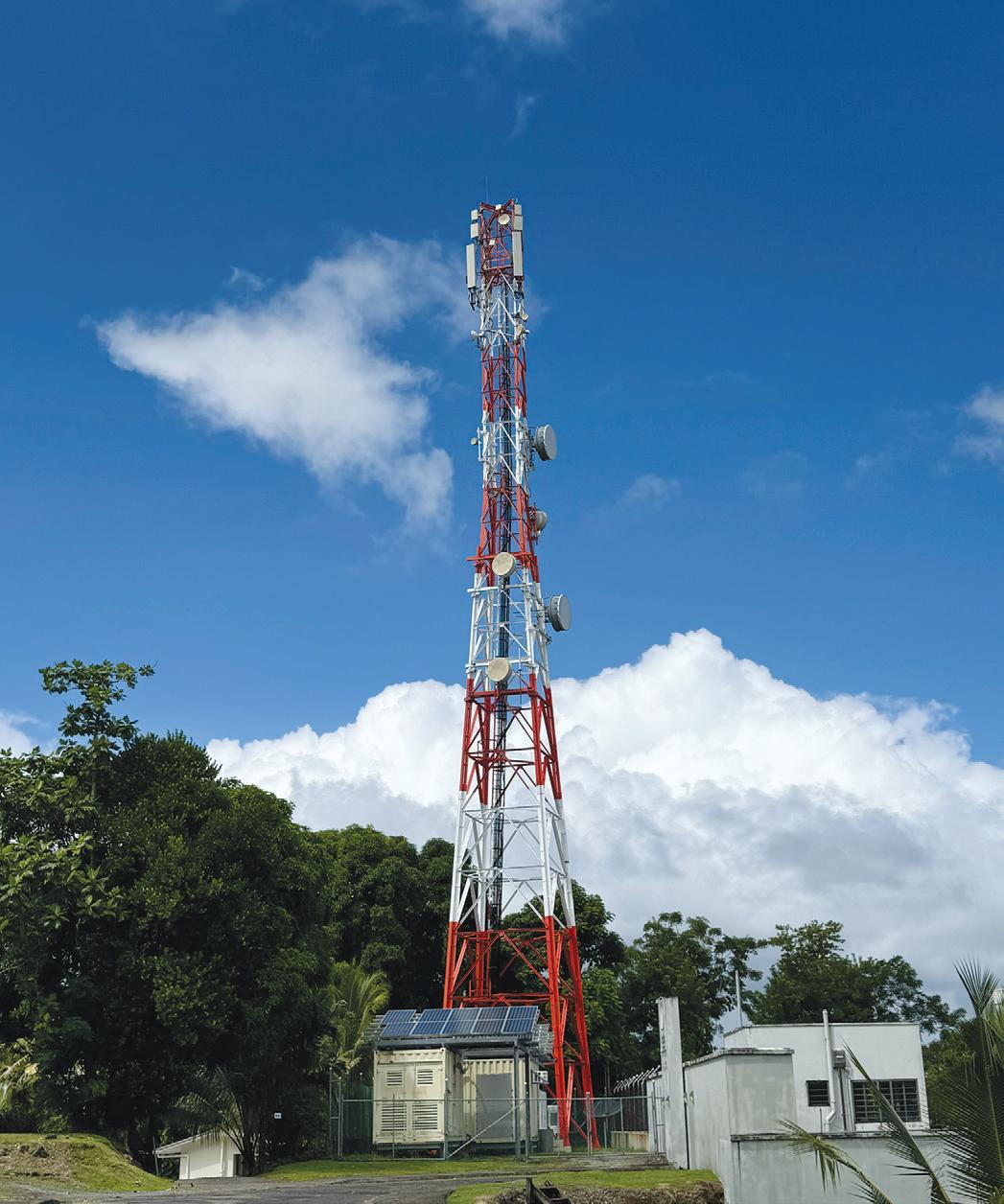
THE COMPETITION IS FIERCE BECAUSE EVERYBODY CAN OFFER THE SAME TECHNOLOGY.
One of the most positive outcomes for Fiji’s businesses and citizens has been the gradual digitisation of government services. Online platform BusinessNOW Fiji has consolidated 25 e-services from 16 government agencies into one digital platform. Kamikamica says the site “significantly improves approval times for businesses from months to days, enhances transparency, reduces bureaucratic hurdles and simplifies access to government services.”
Attar Singh, Chairman of Telecom Fiji and a director of Amalgamated Telecom Holdings (ATH), which owns Telecom Fiji, FINTEL and Vodafone Fiji, says having all these newcomers in the market is generally positive.
“The Google cables give us more resilience in terms of redundancy,” he says. “In the event of one cable failure, then Fiji remains connected.”
Satellite internet constellation Starlink is also providing services to Fiji’s most remote communities, alongside Kacific
and other satellite services. Singh believes that, while nothing beats fibre for “clarity and connectivity,” satellite is a boon for remote communities.
“Fiji has more than 300 islands and the people in those islands are so far not connected,” he says. “For those who have nothing, Starlink is as good as one can have.”

Datec (Fiji) has carved a niche as the go-to IT service company, but CEO Vinit Nand believes it can expand further by utilising skills from Fiji’s burgeoning Information Technology Outsourcing (ITO) sector.
By Paul Chai
While Datec (Fiji) is subsidiary of Vodafone Fiji, it has a very distinct role in Fiji’s telecoms sector.
“Obviously the telcos and IT go hand in hand because you need an IT partner to support the telcos,” says Vinit Nand, Chief Executive Officer, Datec (Fiji).
Datec (Fiji) supports all of the companies in the ATH Group (see box on page 28) and will celebrate 40 years of operation this year. It also offers its services to other Pacific companies and hopes to expand even further. However, the portability of IT skills is both a blessing and curse.
“The technology is the same across the world — it’s universal,” Nand tells Business Advantage Fiji “It could be used anywhere and that’s a plus point but, to stand out as an IT service provider, that is only possible by keeping our skills up-to-date with certifications.”
This high level of training also helps with retention of Datec staff, which is important at a time where Fiji is having issues keeping local talent. The company undergoes an ISO audit every annually and has accreditations with all the major IT vendors such as Microsoft, Dell and Lenovo.
With a broad customer base that includes Fiji’s government,
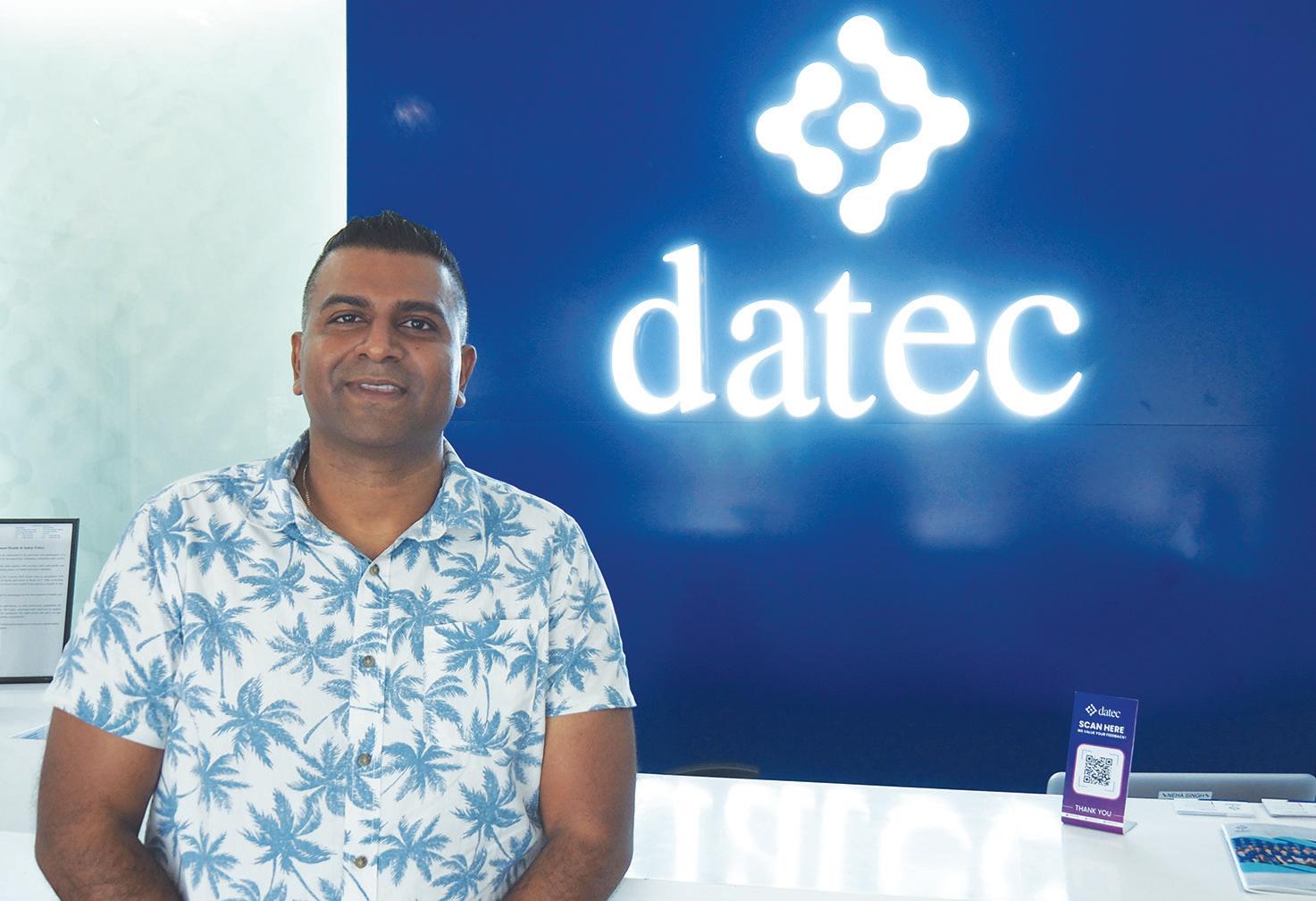
large corporates, retailers, traders and small-to-medium businesses, a key issue is keeping clients safe. Datec’s SmartFalcon cybersecurity team is spreading the word on critical data backup, updates and team training.
A LOT OF MID-TIER BUSINESSES MAKE THE MISTAKE OF LOOKING AT THE INVESTMENT INSTEAD OF THE RISK – THEY UNDERESTIMATE THE RISK AND GET IN TROUBLE.
Vinit Nand, Chief Executive Officer, Datec (Fiji)
Starlink first came to Fiji via Lightspeed Pacific, a business formed in Papua New Guinea whose Executive Chair Richard Broadbridge is a Fijian with a passion for connecting the outer islands.
“In Fiji, there’s potentially thousands of sites out there that don’t have electricity, don’t have connectivity, and don’t have a means of allowing those rural people to connect with the outside world,” he says. “With Fiji having such a huge reliance on tourism, we are trying to see whether we can assist by way of providing another income source for rural Fijians [via potential internet-based enterprises].”
Lightspeed Pacific overcomes the lack of electricity in farflung parts of Fiji with integrated solutions that include solar power.
The next big thing is the arrival of a 5G network and Farid Mohammed, CEO of Digicel Fiji, says the arrival of the
“A lot of mid-tier businesses make the mistake of looking at the investment instead of the risk,” Nand says. “They underestimate the risk and then get into trouble.”
With Fiji experiencing an increase in offshore BPO service centres, Nand thinks an area of growth is combining these skills with IT.
“Utilising Fiji’s skilled resources and stability, we can explore setting up network operations centres and security operations centres for a range of customers not just in Fiji and the Pacific but further afield,” he says.
service will add badly needed capacity to the network.
“Fiji’s mobile data usage is almost two times higher than Australia,” Mohammed tells Business Advantage Fiji “This is because broadband penetration is very low, so all consumption is on a mobile device.
“For us to continue to meet that demand, we need to keep introducing more capacity and 5G is going to allow that.”
Fiji has such a competitive telecoms landscape that “there is a portion of the market that will change SIMs every week” shopping around for the best deal, according to Elenoa Biukoto, Chief Executive Officer at Vodafone Fiji.
“The competition is fierce because everybody can offer the same technology,” she says. That means the focus is on “what kind of service you are able to provide with that.”
Vodafone’s M-PAiSA digital banking solution is one such differentiator, with over 300,000 users on the money transfer and payment service. The service has spurred on Fiji’s move into the digital finance space, one that is expected to grow
Amalgamated Telecom Holdings Limited (ATH) provides telecommunication services in Fiji via subsidiaries Telecom Fiji, Vodafone and FINTEL and has operations across the Pacific region. CEO Ivan Fong talks to Business Advantage Fiji about profits, growth and big guns like Google and Starlink.
ATH reported a great financial result in 2024 with a net profit after tax of F$9.2 million — a 138 per cent increase. What do you put this result down to?
Our blue-chip companies like Vodafone and Fiji Telecom generated good cash flow for us. We have a few key markets across the Pacific, but Fiji is very important. Vanuatu and Samoa have also done well. We have moved market share in both of those markets from 30 per cent penetration to around 50/50, going head-to-head with Digicel Pacific.
If things go according to plan, then Vodafone Papua New Guinea is going to be bigger than all of the rest of the companies in the group.
Our market share by customer numbers is just over 30 per cent currently and we expect it to grow, along with the PNG economy. How are you hoping to grow ATH over the next 12 months?
We recognise that a lack of skilled workers in Fiji can be limiting for us, but we also have the benefit of operating in other Pacific markets.
How concerned are you about competition from Starlink and Google?

Starlink is the one that competes with us on the ground and that has had an impact. But we also see opportunities, especially wholesale deals that could help operators connect the unconnected. In a big market like PNG, we could work with Starlink to help us improve connectivity. We also think there is immense value for Starlink in the remote areas of Fiji and the Pacific.
THE PACIFIC HAS PLEADED FOR INCREASED RESILIENCE AND ROBUSTNESS IN ITS NETWORKS FOR YEARS AND IT’S NOT EVERY DAY YOU GET A CABLE RUNNING BY YOUR DOORSTEP.
Ivan Fong, CEO of Amalgamated Telecom Holdings Limited
Our Papua New Guinea operation has more than 75 per cent graduates, and we have talented people in Samoa and in the Cook Islands. So, we are looking at a model of ‘reverse mobility’ where, if employees do well, they come into Fiji and we can build our resources here.
In terms of the markets, we see data consumption continuing to grow. This growth is being driven around entertainment, online platforms and, of course, AI.
In Fiji, there is room for growth in the digital strategies of government and in getting businesses online because there are still very few businesses online. From the ICT and telecoms space, that’s going to drive growth in the medium term and it is not dependent on population growth.
with the new services.
“You can buy anything in Fiji with M-PAiSA,” says Biukoto. “It is also linked to Mastercard, so it can be used offshore.”
At Digicel, Mohammed says they seek to differentiate themselves via bespoke solutions and add-on services like cyber security. The company is also developing the home
(ATH)
Google is bringing in the Bulikula and Tabua subsea cables. The Pacific has pleaded for increased resilience and robustness in its networks for years and it’s not every day you get a cable running by your doorstep. The challenge in many markets is funding especially where the investment case does not stack up. A lot will depend on Australia, the US State Department and others fronting up with support, but from our point of view, it’s an opportunity that people should earnestly look at.
It’s also about knowledge transfer, not just Google putting a cable in here. The real advantage is they do things that are leading edge. They might not want to share all of that with us, but there’s certain elements that would benefit our economies.
Also, Google, Amazon and Meta bring their own investment guidelines that require them to be sustainable and that is one of the things we want them to help us develop. This will flip the whole data centre business model on its head. Businesses will not just be building data centres with good connectivity; they will also be building data centres where you have good economies around green energy.
entertainment space and has launched its DTV App streaming service to take advantage of the incoming 5G speeds.
“We have a strength delivering high speed internet to Fiji’s outer islands where there is no fibre infrastructure. While businesses on the mainland rely on the fibre network, the ones on the island don’t have that luxury,” he says.
The Business Process Putsourcing (BPO) sector in Fiji looks set to double in the next decade. Carol Watkins, Chief Executive Officer at one of Fiji’s largest BPO providers Centrecom, talks to Business Advantage Fiji about how her company is keeping pace with the sector’s rapid expansion.
By Paul Chai
Fiji has long known that it needs to diversify a tourism-heavy economy, and the pandemic offered it a unique opportunity in the Business Process Outsourcing (BPO) space.
Centrecom is one of Fiji’s top BPO providers. It provides outsourcing for contact centre services, back-office functions, airline revenue services and general administration services. The company specialises in aviation and has clients like Hawaiian Airlines, Thai Airways and Fiji Airways. However, it has plans to expand into other sectors.
“We’ve seen huge growth with e-commerce work,” says Carol Watkins, outgoing Chief Executive Officer at Centrecom. “We’ve also seen a lot of growth in retail, insurance work, financial back-office work, as well as virtual assistants. We recently got ISO 27001 certification, which covers data protection and information security.
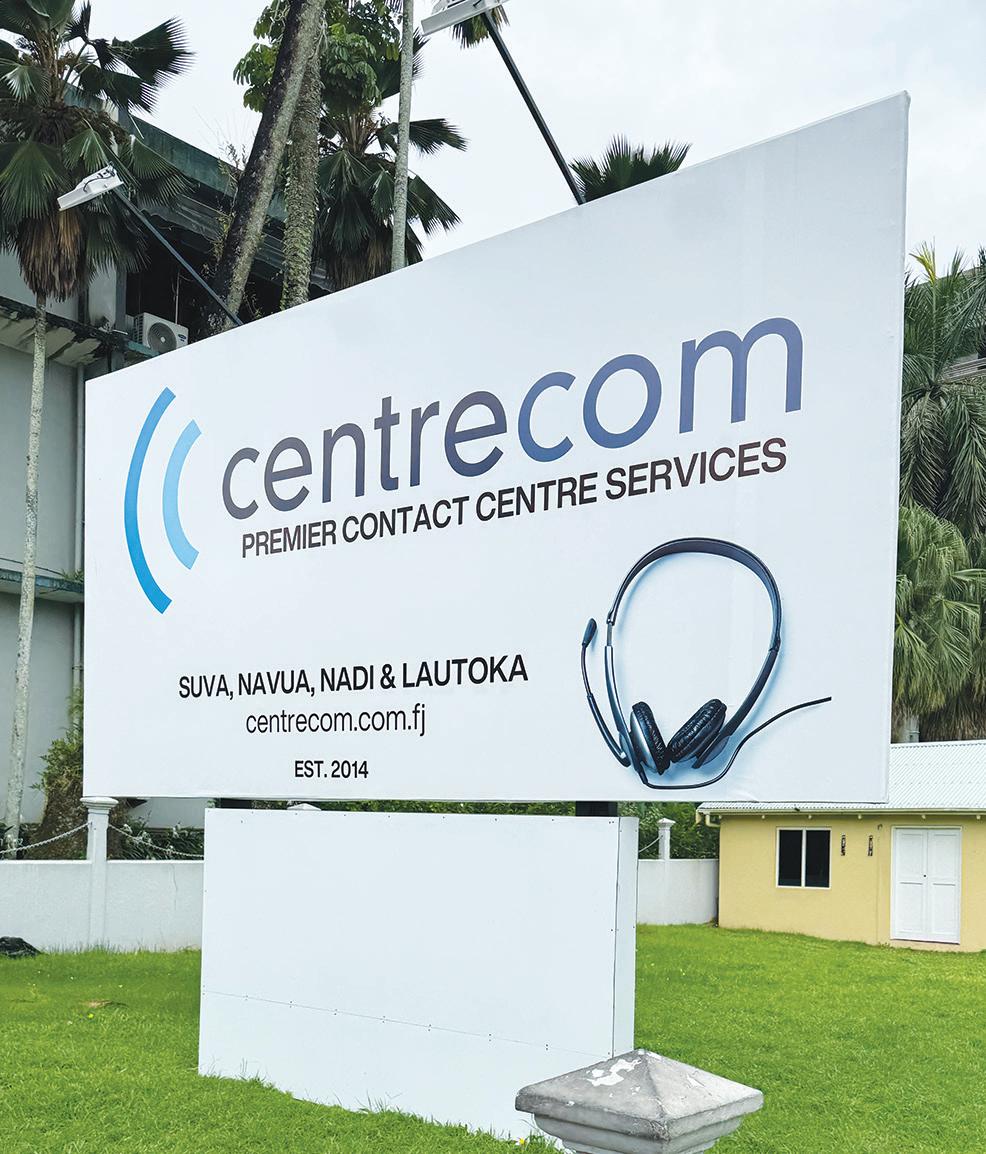
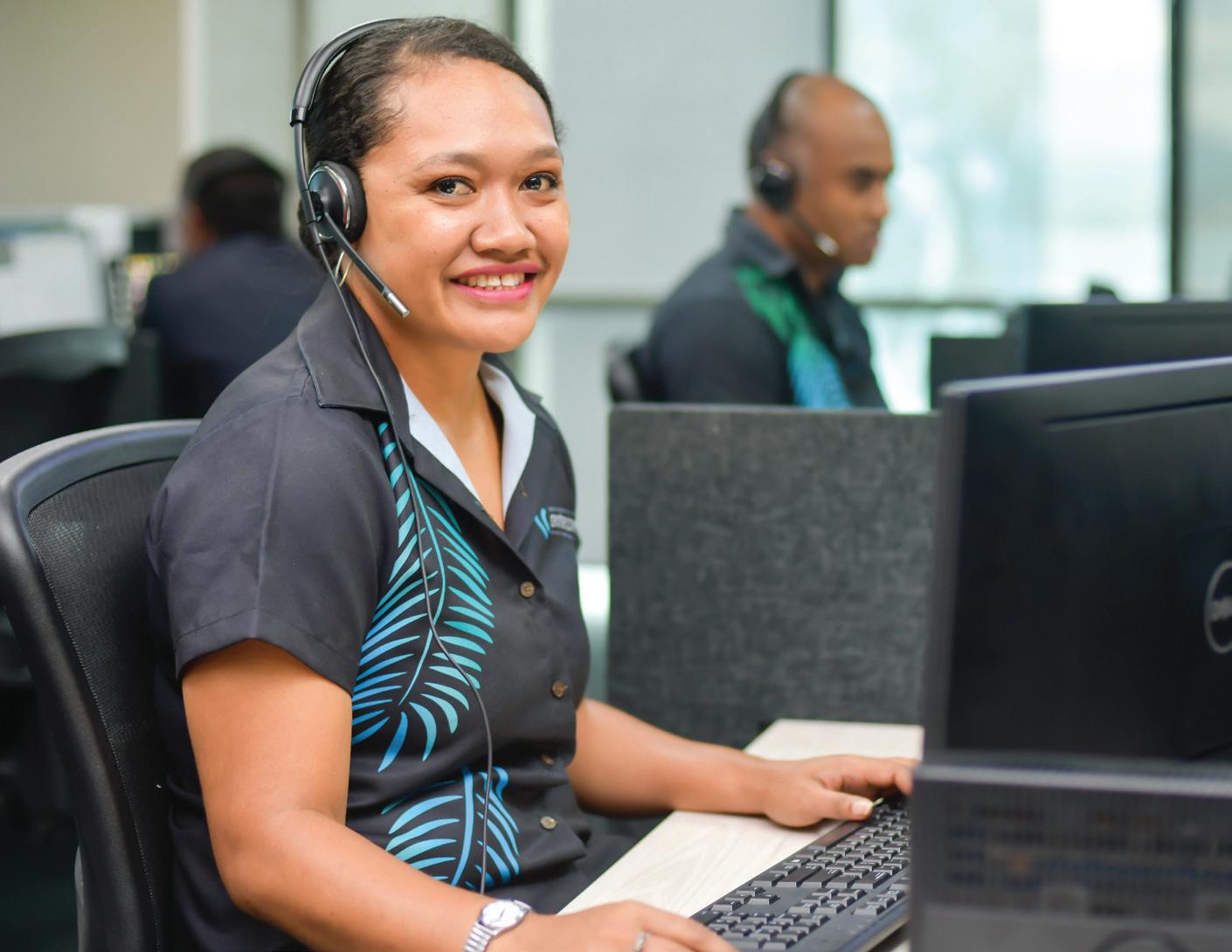
OUR HEADCOUNT AT CENTRECOM IS PROJECTED TO DOUBLE IN THE NEXT 10 YEARS.
Carol Watkins, Chief Executive Officer at Centrecom
We are the only BPO in Fiji that has that certification, and that sets you up on the global stage.”
Key to success for a BPO company is a highly trained workforce. BPO workers are regularly customer-facing, and this requires training in English language, numeracy and basic computer skills. They must also learn the scripts and protocols of each client.
“When it comes to client training, we follow the ‘Train the Trainer’ model,” Watkins says. “A new client comes onboard and they train our trainer, and our trainer will continue
the training for new hires.”
Centrecom does not wait for clients to come to them before training people up.
“We offer a lot of free training,” she tells Business Advantage Fiji. “During school holidays, we run free customer service training, and that helps us build up a talent pool and identify people that have the skills that we’re looking for.”
“We’re focusing on bringing in young people with no experience straight out of school rather than experienced people, because we find the attrition is higher for experienced people,” Watkins says. “But, if you’re bringing in someone out of school and offering paths for career growth, then they will stay longer.”
Watkins says outsourcing Fiji is appealing because the locals have a neutral accent and high literacy levels, while the country has reliable and affordable connectivity.
“Our headcount at Centrecom is projected to double in the next 10 years,” she says. “We are at around 10,000 employees now and I would expect to see us grow to 25,000 over the next decade.”

Swire Shipping has deepened its presence in Fiji in recent years, marked by a commitment to helping local customers meet a unique set of challenges and opportunities, as group CEO Jeremy Sutton shares with Business Advantage Fiji.
By Nadav Shemer Shlezinger
For veteran maritime transport provider Swire Shipping, Fiji has become more than just another stop in the AsiaPacific.
Swire’s ships have been calling in at Fijian ports for more than 75 years, but in the past decade the company has made a conscious push at “really getting our own boots on the ground,” Group CEO Jeremy Sutton tells Business Advantage Fiji. Today, the Singapore-based company employs around 100 Fijians, and 10 of its regular services call in at the country’s two main ports, Suva and Lautoka. Two of these services – the Pacific Weekly Express and the
fortnightly Pacific Islands Service –operate on fixed-day schedules.
It also provides landside logistics through a joint venture with local company General Machinery, as part of a vision to provide a “one-stop shop” to international shipping customers.
Swire launched its fixed-day services in 2023, after conversations with Fijian customers revealed an urgent need for reliability.
HAVING OUR OWN PEOPLE ON THE GROUND, CLOSE TO CUSTOMERS, REALLY HAS WORKED.
Jeremy Sutton, Group CEO, Swire Shipping
“The global norm has very much moved to fixed-day [schedules],” Sutton says, acknowledging that, “for various reasons – infrastructure difficulties, the size of the markets, and so forth –we and our competitors in the South Pacific have been slow to get to that point.”
Sutton says Swire’s new fixed-day services provide its customers with the predictability they need to manage their costs and inventory levels.
It also benefits port operators, he adds: “If they know one year in advance exactly when a ship will arrive, it obviously helps with them planning and reducing congestion.”
Swire’s increase in activity in Fiji has coincided with a sharp increase in twoway trade – with a more than two-fold increase in exports and almost four-fold increase in imports since 2000.
Much of this increase has come from FIJI Water, which accounted for around 14 per cent of Fiji’s F$2.57 billion in exports in 2024.
We have two international airports, Nadi and Nausori, and we have 13 outer island domestic airports for Fiji. We also manage the airspace of Fiji, Vanuatu, New Caledonia, Kiribati and Tuvalu, covering an area of six million square kilometres.
With tourism in Fiji continuing to grow, we need to improve connectivity, improve the passenger experience, and better connect tourists from Nadi to all the islands of Fiji.
In Nadi, we are expanding the arrivals area.
We can have up to 1700 people in that small area at one time, we need to expand it as quickly as possible.
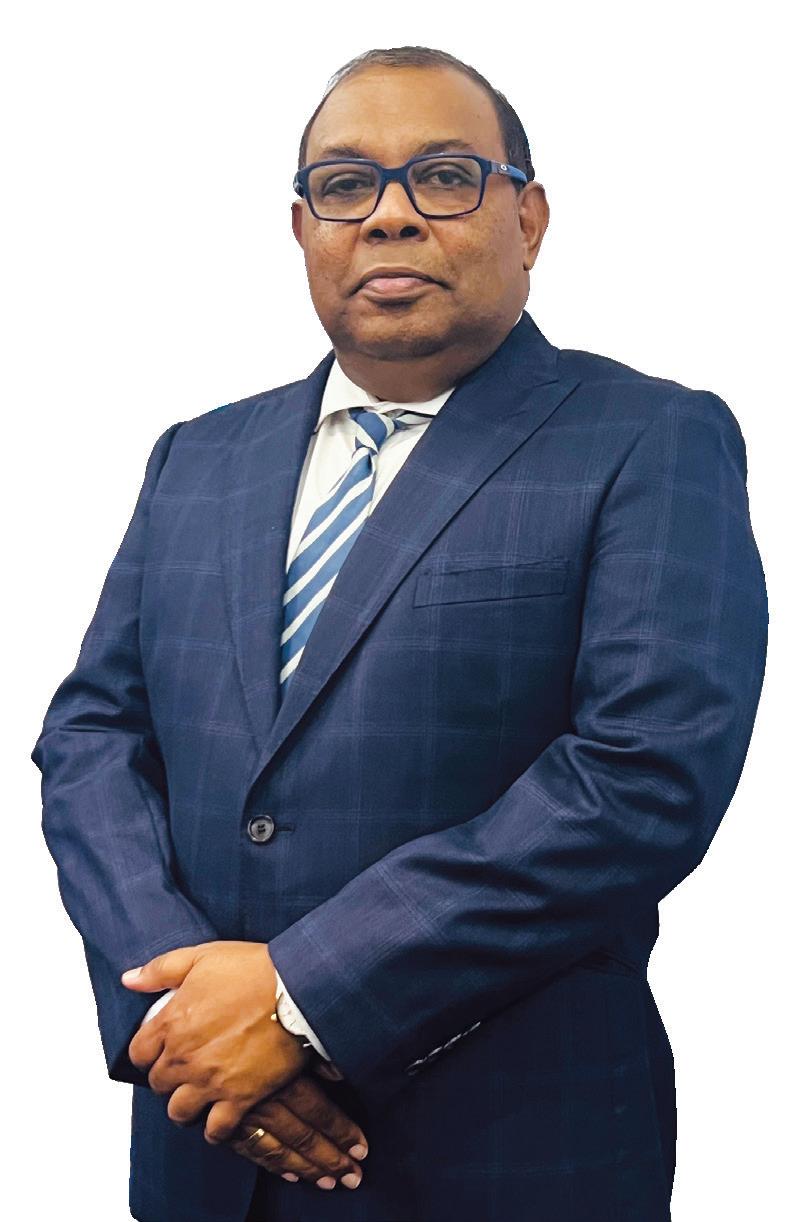
“The entire supply chain assists with effectively moving FIJI Water containers into the US, and we’re very much part of that,” Sutton says.
Another positive development, according to Sutton, has been Fiji’s

We also have the transit market to consider, so we will need a bespoke hub. Fiji Airways launched their Dallas route in December last year, which is bringing people from the US to transit to the cruise market. We are going to have to build new facilities and it gives us an opportunity for more retail
We are even looking at the possibility of an entirely new domestic airport in Nadi but that will all depending on funding.
A key part of all these upgrades and improvements is sustainability. In Fiji, we are heavily impacted by climate
growing role as a regional re-export hub. Re-exports accounted for 46 per cent of Fiji’s total exports in 2024, compared to just 14 per cent in 2000. For example, as most Pacific-island countries lack storage capacity to import petroleum, Fiji acts as a hub by first importing petrol and then reexporting to regional buyers.
“All of our customers are looking for ways to grow their business, not just to make more money but also to retain talent,” Sutton says. “Re-exporting to the islands is one area of opportunity.”
While Fiji is in a strong position regionally, Sutton notes that it has not been immune to volatility stemming from global events.
“Ultimately, our ships coming out of Asia are competing in Shanghai and

change and our infrastructure has to be climate-resilient.
Sustainability has to have a holistic approach. For example, our procurement policy includes green procurement. We also have the largest electronic car fleet in Fiji.
Fiji Airports is also undergoing a digital transformation. About 92 per cent of our travellers are international travellers, and 80 per cent are Australians or New Zealanders, so we are updating to provide self-check-in kiosks, and automatic bag drop, as well as biometric screening and eGates. This will all happen over the next five years.
Singapore and Japan with those same ships that are going to the Red Sea and the US,” he says. “That trickles down, and it’s why we try as much as possible to ring-fence the impact of that on deliverability into the Pacific.
Global events have also sent costs for building ships, chartering ships and filling containers to “the highest I’ve ever seen,” says Sutton.
“Again, it doesn’t matter if you’re in Fiji or in Europe or the US, it’s the same international market,” he adds.
But despite the headwinds – or perhaps because of them – Swire has only strengthened its commitment to the Fiji market.
Its Fiji team are all Swire Shipping employees, “just like I am,” Sutton comments. “Having our own people on the ground, close to customers, really has worked.”
The Vinod Patel Group has grown to impressive size for a family-owned retail, wholesale and retail business operating out of a small market. CEO Rahul Amin shares the company’s growth plans with Business Advantage Fiji.
By Nadav Shemer Shlezinger
When Vinod Patel opened a hardware store in his hometown of Ba in 1962, he could only have dreamt that it would grow into one of Fiji’s most successful family-owned businesses.
Patel passed away in 2024, but his name lives on through the Vinod Patel Group, a vertically integrated conglomerate.
With 18 hardware and 20 Home & Living stores, retail is the group’s core business. Its portfolio also includes numerous businesses operating throughout the Pacific, including Tube Makers, a manufacturer of PVC and polyethylene pipes and fittings; MetFrame, a specialist in steel products; and Pacific Cables, which makes electric cables.
It also holds minority stakes in Pacific Cement and Basic Industries, Fiji’s largest suppliers of cement and concrete respectively. In 2016, it


entered the industrial gas market with the acquisition of BOC’s Fiji and Samoa operations, now trading as Oceania Gas.
According to CEO Rahul Amin, this level of diversification is a necessity for a business operating out of a country with fewer than one million people.
“The market is very small,” he tells Business Advantage Fiji. “For us to grow our business, there’s only diversification and acquisitions.”
The strategy appears to be paying off, particularly when a construction boom in Fiji and neighbouring countries is driving demand for its building materials and products.
“Tourism is driving lots of construction of hotels, which is flowing through to other businesses,” Amin says. “The FMCG [fastmoving consumer goods] market is also booming. They’re building more warehouses, creating a snowball effect which construction is also a part of.”
Always looking for new ways to grow inside Fiji, Vinod Patel is investing in larger “big box” stores – with the first ones due to open in Nadi, Labasa and Lautoka this year.
These stores will provide a space for the group to display all 15,000 of its
FOR US TO GROW OUR BUSINESS, THERE’S ONLY DIVERSIFICATION AND ACQUISITIONS.
Rahul Amin, CEO of the Vinod Patel Group
products, “which currently is an issue because most of our stores in town are very small,” says Amin.
Interestingly, Vinod Patel’s bigbox strategy comes at a time when more smaller stores are opening up throughout Fiji that are stocking cheaper imports from abroad.
Undeterred, Amin says the business is putting effort into educating its customers about the quality of its products.
“If you walk through our stores, there’s lots of point-of sale material in terms of helping customers choose what to buy,” he says. “The market is changing: customers are realising that quality is more important than the price point.”
An innovative new private-public partnership (PPP) between Australian-based healthcare group Aspen Medical and the Fijian government is making sure Fiji’s hospitals are in excellent health.
By Paul Chai
Up until 2022, you could not get openheart surgery in Fiji. But now, thanks to an innovative private-public partnership (PPP) – between Australian-based healthcare group Aspen Medical, Fiji National Provident Fund and the Fijian government – this and many other new health services are available for the first time.
“We operate across 22 countries globally, but the PPP component is a first for Aspen Medical, so this is the flagship,” CEO Gavin Whiteside tells Business Advantage Fiji
Initially signed in 2018, but delayed due to the pandemic, 2022 saw Aspen Medical begin in earnest to develop, finance, upgrade, operate and maintain Lautoka Hospital, Fiji’s second largest hospital, and the new Ba sub-divisional hospital.
For Lautoka, this meant an overall ‘fix’ – while keeping hospital services running – and the introduction of the cardiac services.
“We brought open-heart surgery to Fiji and, to bolster that, we have
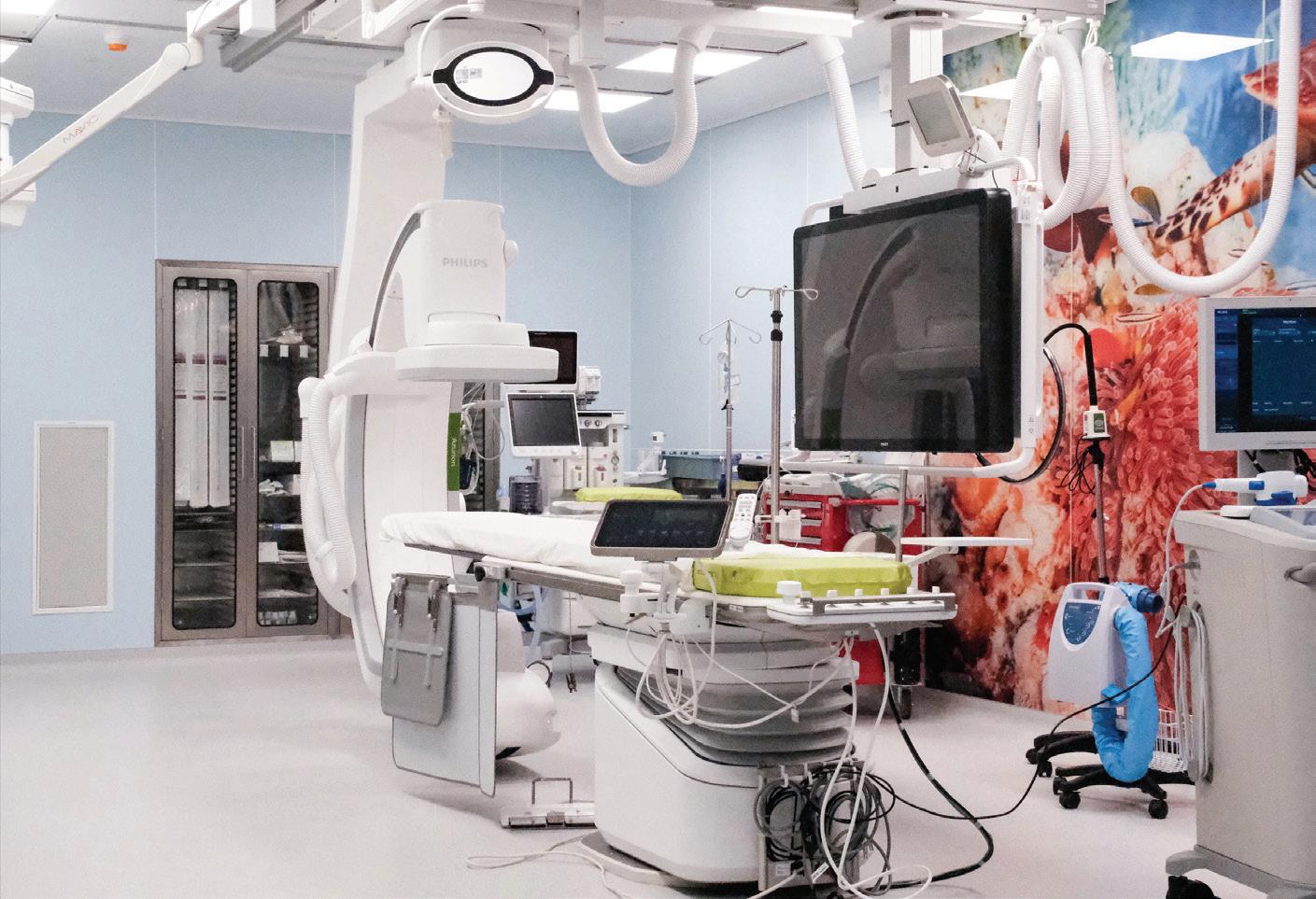
just introduced a catheterisation lab, which is a critical part of the cardiac infrastructure,” Whiteside says. “In addition, we have inaugurated an MRI suite and our emergency department is being expanded to incorporate a larger triage area and something new for Fiji, which is four fast-track beds. The current upgrade also includes an Isolation Room.”
The catheterisation laboratory is a specialised area where doctors diagnose heart and circulatory conditions, while fast-track beds aim to assess, treat and discharge less seriously ill patients more efficiently.
role as a trailblazer and says it plans to use any lessons it learns across its global operation. But he also hopes that Aspen Medical’s experience can help lift the whole of the Fijian healthcare system.
“This PPP is for 23 years, with an option for another 20, so we’re potentially looking at 43 years,” he says. “We’re confident it will become a blueprint that we can take to other hospitals around the country and across the Pacific.”
WE’RE CONFIDENT IT WILL BECOME A BLUEPRINT THAT WE CAN TAKE TO OTHER HOSPITALS AROUND THE COUNTRY AND ACROSS THE PACIFIC.
Gavin Whiteside, CEO of Aspen Medical
The PPP will also implement a new ICT system, enhanced communications facilities and financial management, and build a 100-bed student accommodation facility.
Ba Hospital was a different challenge altogether with Whiteside suggesting it had been “quite a journey”.
“What we were given was ultimately a shell that had lain dormant for several years, which we needed to fully operationalise,” he says. “The team did that in a little under 12 months. They created a 70-bed hospital that services the Ba catchment area.”
Whiteside is proud of the company’s
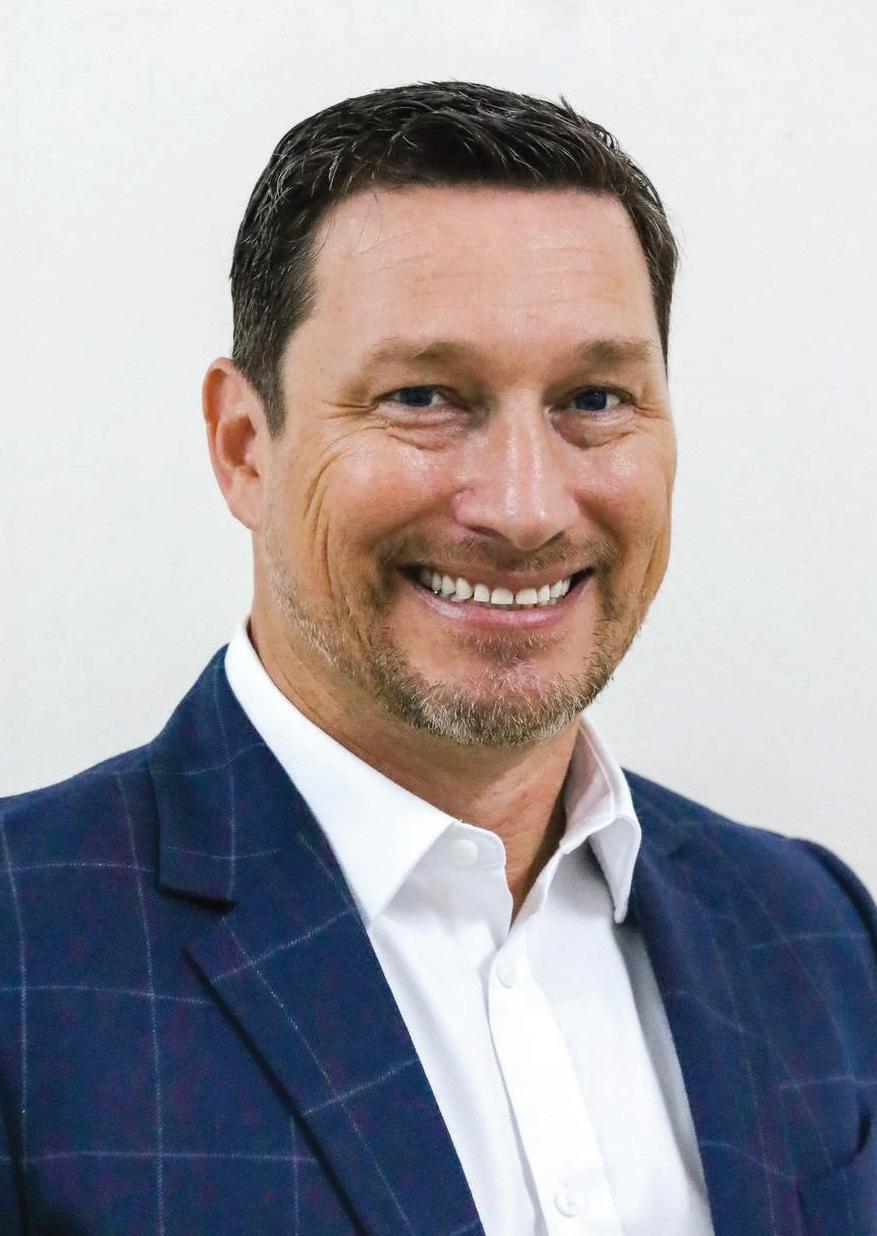
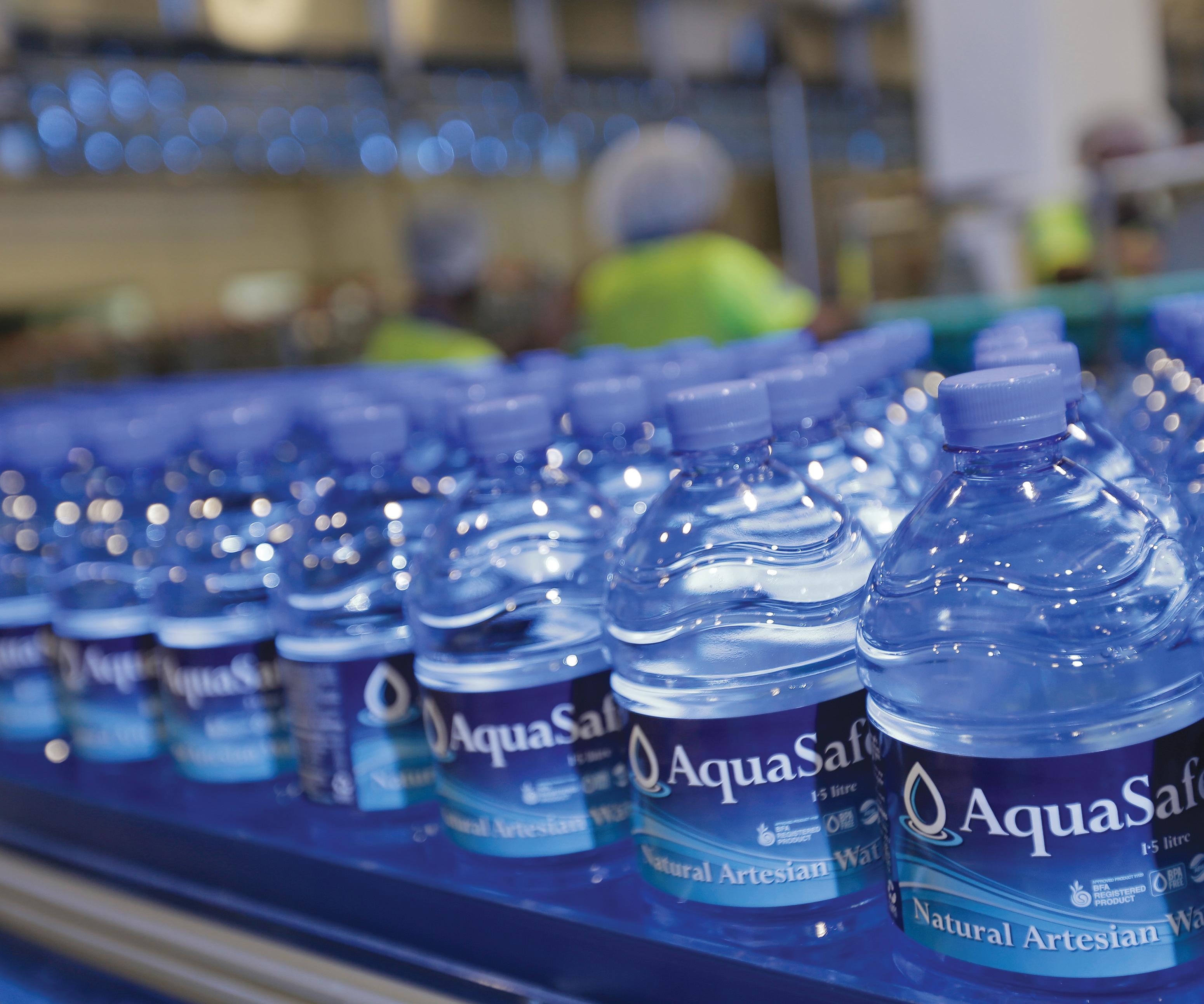
Natural artesian water is Fiji’s single largest physical export, accounting for some 25 per cent of domestic exports in 2024. Leading local exporter Pleass Global has built a thriving bottled water business based on its own water resource. With bold investments, the company is now positioned for major export growth.
By Andrew Wilkins
On 420 acres of rainforest at the base of the Namosi Highlands, just outside Suva, sits one of Fiji’s most ambitious and environmentally conscious export businesses.
Pleass Global, a family-led company founded nearly three decades ago, has
quietly transformed itself from a niche home and office water supplier into a major bottled water exporter and diversified business.
“We’ve grown from delivering refillable bottles around Suva into a dual-brand operation with strong positions in Fiji and overseas,”
Joint CEO Cate Pleass tells Business Advantage Fiji
THERE’S HUGE OPPORTUNITY IF WE PROTECT THE QUALITY OF WHAT WE EXPORT.
Cate Pleass, joint CEO of Pleass Global
Pleass Global’s original AquaSafe natural artesian water brand is well established in both Fiji and other Pacific markets such as Papua New Guinea and Vanuatu, and is a sponsor of the Fijian Drua rugby union team. Meanwhile, its VaiWai natural artesian water export brand has found success in the United States, China, and the Middle East. The company’s water has been consistently assessed by the International Taste Institute in Brussels as being of top quality.
To keep up with demand, the company – which listed on the South Pacific Stock Exchange in 2009 –operates three bottling lines and runs six days a week, with its 200 staff working up to three shifts per day.
“We’re now entering a different
phase of growth,” says Pleass. With major U.S. retailers coming onboard, export volumes are set to surge. The company is investing F$22 million to double the footprint of its current warehouse and bottling facilities at Namosi and is spending an additional F$8 million on a new distribution centre on its own land near Nadi.
In addition to water, Pleass Global supplies compostable food packaging to local airlines and hotels, and has moved into glass bottling and innovative niche products, such as its 10-litre bag-in-box water to meet demand for more ecofriendly options.
Tourism is another frontier. A section of the company’s organicallycertified land hosts the Kila World eco-adventure park, catering to tourists and locals.
“It’s low-impact, consistent with our environmental values, and gives visitors a chance to see organic farming and rainforest up close,” Pleass explains.
Pleass is bullish both about Fiji’s brand power and further export potential.
“There’s huge opportunity if we protect the quality of what we export,” she says.
Protecting the integrity of its artesian water source, fed by annual rainfall of
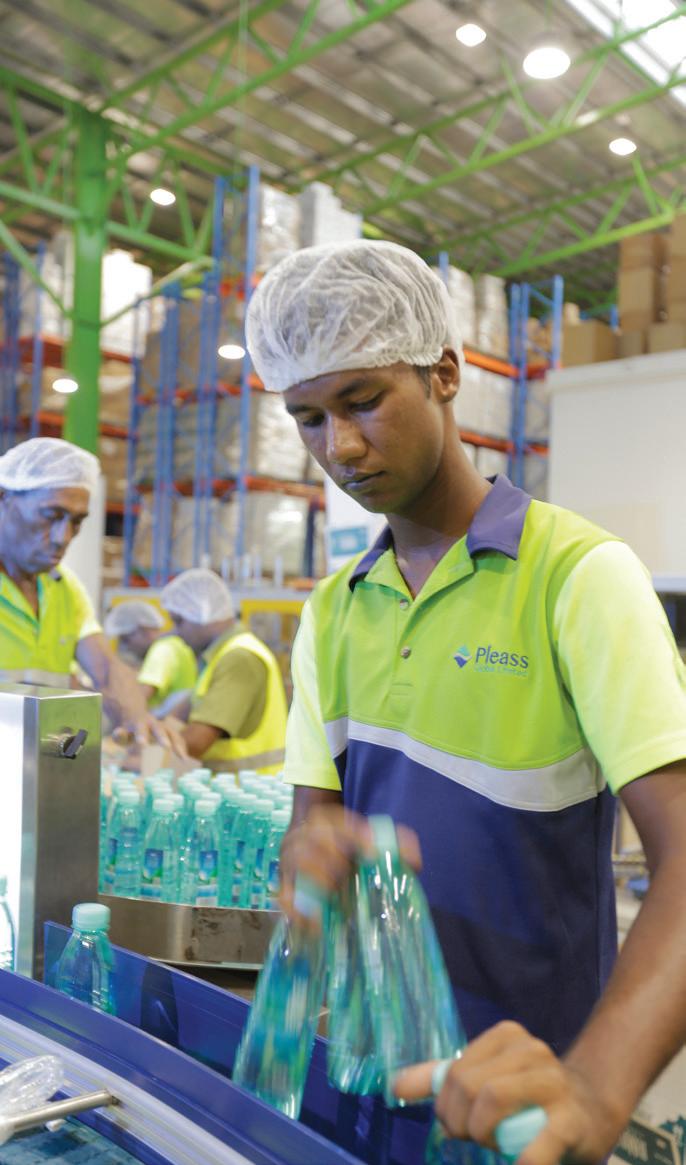
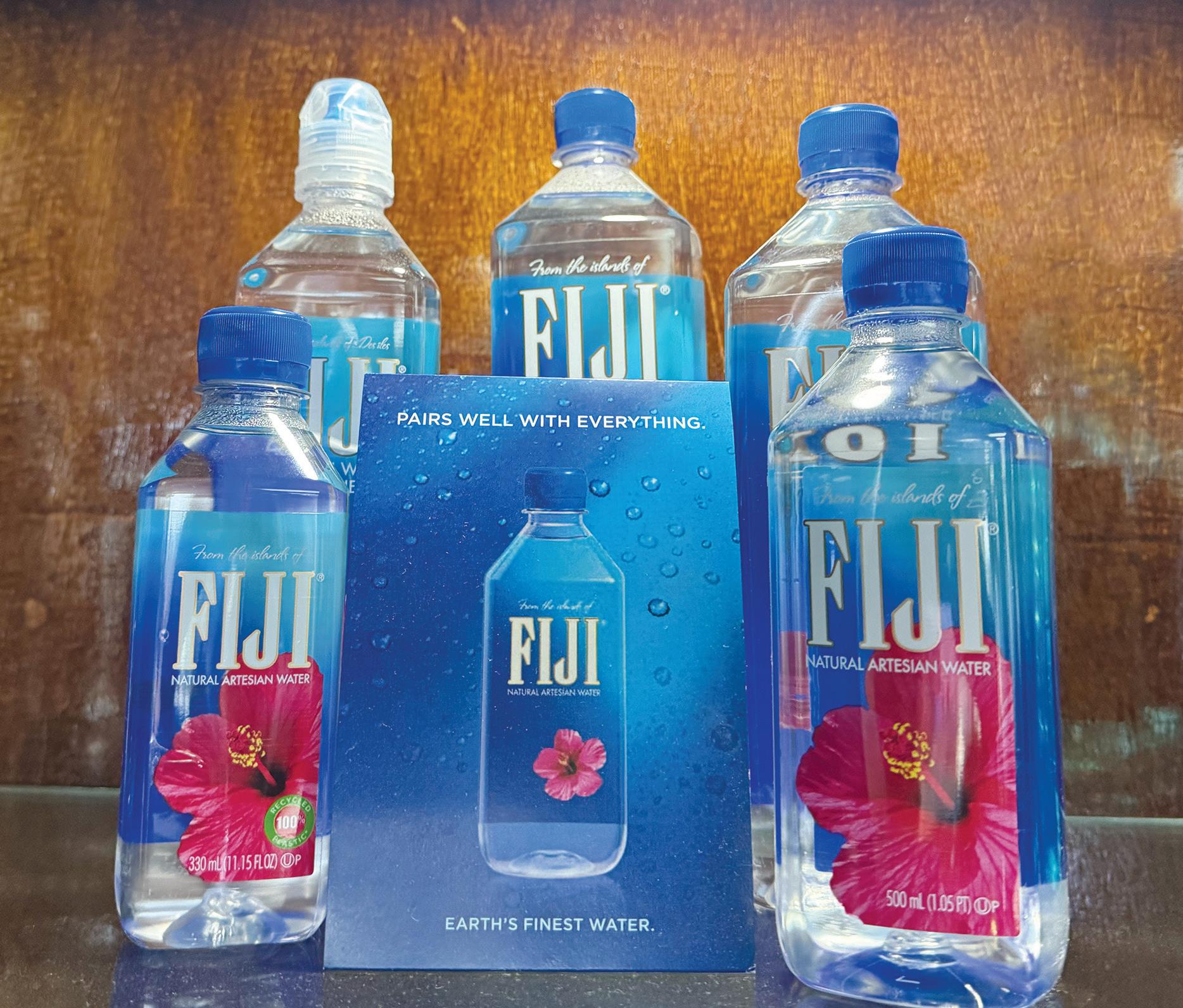
The US-based owner of FIJI Water, The Wonderful Company, has upgraded its bottled water facilities and plans on expanding its operations into local agriculture.
FIJI Water’s square container is one of the most recognisable bottled waters in the world thanks to shrewd marketing, celebrity endorsements and being the official bottled water at events like the Emmy Awards. FIJI Water is bottled at source in Viti Levu and has become the number-one imported premium bottled water in the United States.
Launched in 1996, FIJI Water is owned by parent company The Wonderful Company – a US$6billion agriculture business – and its owners recently announced they planned to use their knowledge of tropical crops to expand the
some six metres a year, is critical, but the company embraces a much broader sustainability program. As well as organic certification and eco-tourism, it is also spearheading a new industry-led bottle recycling program.
It’s a classic example of industrialisation done the Pacific way,
company’s operations in Fiji.
The company – which produces two-thirds of US fruits – plans to cultivate five fruit tree crops in the south-western corner of Viti Levu: Persian seedless limes, Mexican seeded limes, lemons, papayas and mangoes.
“Our hope is to build a better future for Fiji’s local growers and consumers by ensuring secure and sustainable food supplies,” said Stewart Resnick, Chairman and President of The Wonderful Company in a 2024 statement.
FIJI Water has a workforce of over 400 and last year announced a F$140 million investment in its Yaqara bottling plant aimed at increasing capacity by 47 per cent and improving energy efficiency. The new technology will also result in an upskilling of its workforce.
proving that scale, sustainability, and export sophistication can coexist.
“We’ve got the aquifers, the rain, and the brand. Now it’s about doing things properly and protecting what makes Fiji special,” says Pleass.
As media company Communications Fiji celebrates its 40th anniversary, its founder and Chairman William Parkinson sits down with Business Advantage Fiji to reflect on his company’s rise from a single Suva radio station to a Pacific media powerhouse.
By Nadav Shemer Shlezinger
In an age where traditional media models are being disrupted, Communications Fiji Limited (CFL) Chairman and Co-Founder William Parkinson believes his firm has the formula to not only survive but thrive in two very different Pacific markets.
Founded in 1985 with the establishment of Fiji’s first commercial radio station, FM96, CFL listed on Fiji’s South Pacific Stock Exchange (SPX) in 2001 and now holds a marketleading position in commercial radio in both Fiji and Papua New Guinea.
Parkinson says CFL’s success has been built on intimate local knowledge.
“Because we are from the Pacific, I think we understand our markets in intricate detail, and have come up with a formula to target sectors of the community,” he tells Business Advantage Fiji
“It’s very different from an Australian or a Western model, which is largely age-based, because we have cultural, racial and language factors to take into account.”
This understanding has driven CFL’s growth from a single, youth targeted English-language radio station FM96 to a diversified portfolio of five radio networks, including Viti FM, an iTaukei-language station, Legend FM, targeting English-speaking audiences, and Hindi-language stations Radio Navtarang and Radio Sargam.
CFL has also applied its targeted approach in Papua New Guinea, where it owns three radio stations, as well as a news site, pnghausbung.com.
The company also has a very successful events management arm,
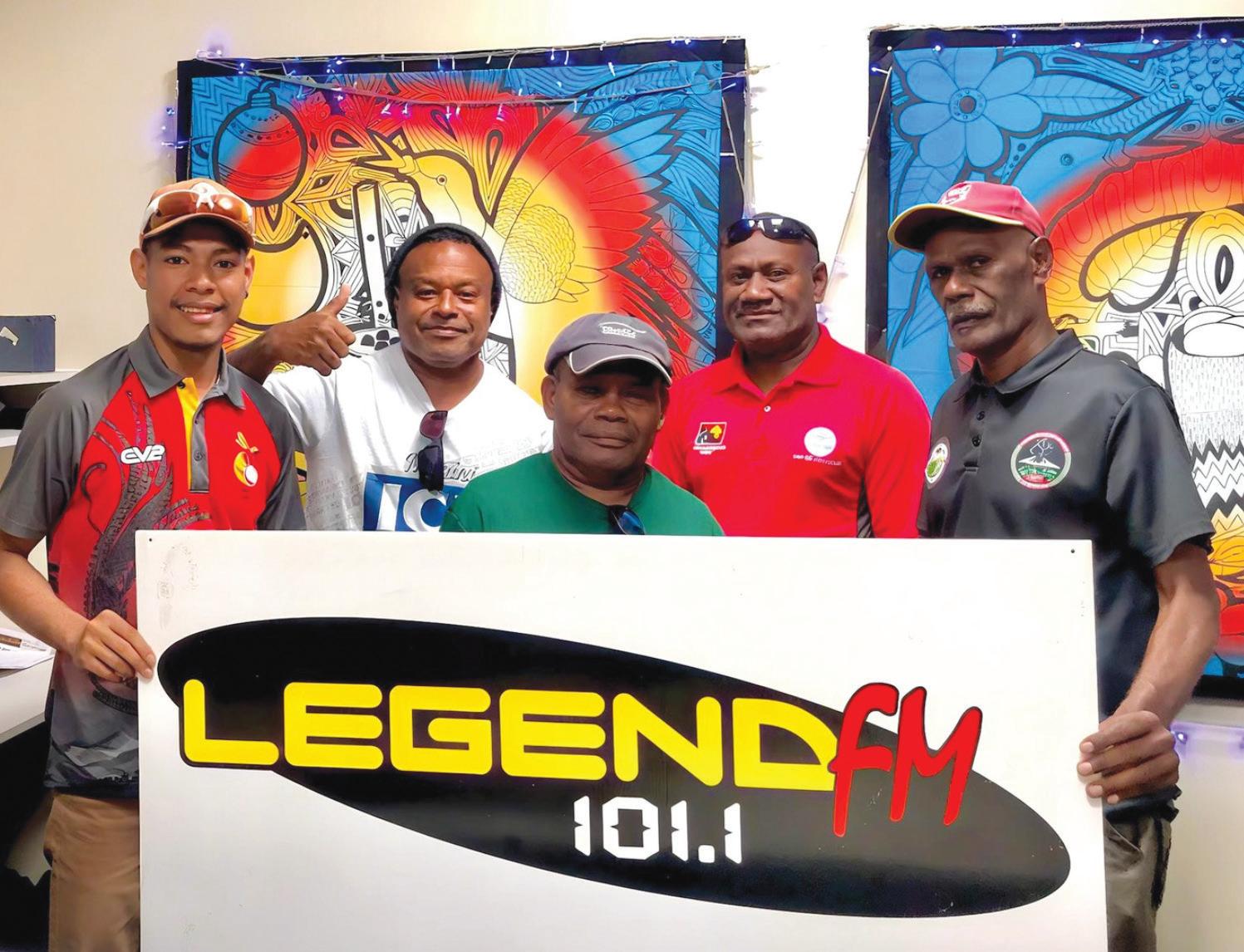
The Total Event Company, operating in both markets.
Digital transformation
CFL turns 40 years old in July 2025 and, while radio remains its core business, the company has embraced digital transformation, owning fijivillage.com.
“We’ve got an audience that is digitally very well-connected,” says Parkinson. “We’ve had to totally change
WE’VE HAD TO TOTALLY CHANGE THE WAY WE LOOK AT TALENT – OUR RADIO PERSONALITIES ARE NOW ALSO SOCIAL MEDIA INFLUENCERS.
William Parkinson, founder of Communications Fiji
the way we look at talent. Our radio talents are not only radio personalities; they have to be social media influencers as well.”
Looking ahead, Parkinson foresees continued disruption to the media sector, particularly in Fiji, where data is cheap and there are high levels of internet connectivity.
“We can see the trends that are coming, so that gives us the chance to prepare,” he says.
CFL’s chairman says the decision to list on SPX almost a quartercentury ago has given his company the discipline to operate through economic cycles, noting that it has “a long history of delivering services through very tough times, often when national services have fallen over.”
Although a lot has changed between 1985 and 2025, Parkinson says “strong demand for local content” remains the main driver for the business.
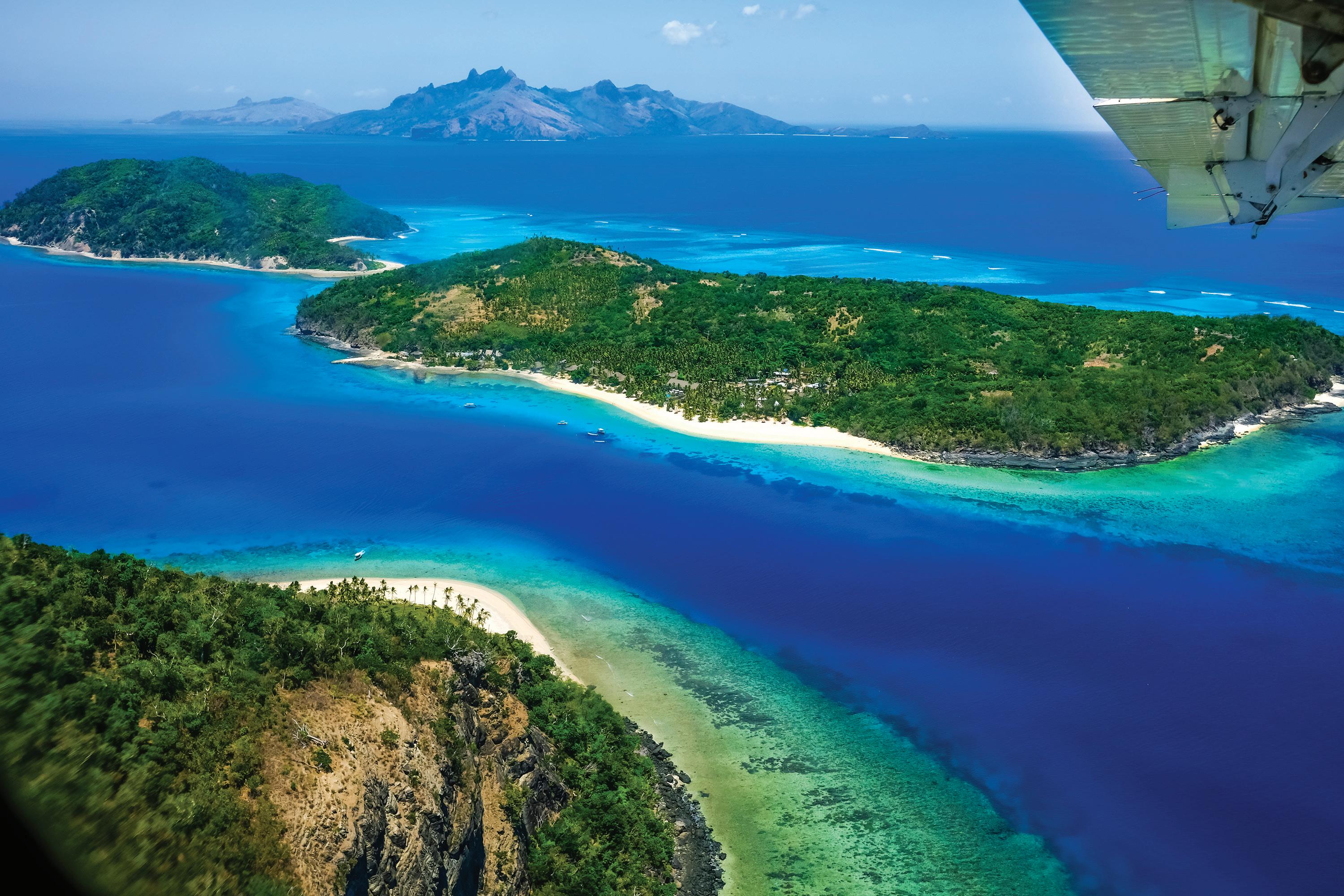
Has this publication got you excited about visiting Fiji? Here’s a brief guide for the business traveller, compiled by the Business Advantage Fiji team.
Although Fiji’s capital currently has a lack of rooms at the four-to-five-star end of the market, the advent of the Hilton Garden Inn in late 2025 should fix the problem. In the meantime, the iconic Grand Pacific (completely renovated in 2014) is the most upmarket option. If it’s full, you could try the other IHG property, the Holiday Inn, almost next door. Also, Quest’s serviced apartments are located right in the middle of Suva’s main commercial area.
In the ‘West’ (Nadi and surrounds), the top hotels are clearly catering to tourists rather than business travellers. (For instance, rooms don’t typically have a work desk.) That is set
to change with the next wave of properties being developed (see page 22).
While Denarau Island is 15 minutes from Nadi’s commercial centre, the Sheraton Resort, Sofitel and (when it reopens in 2026) Westin will certainly let you combine business with pleasure in some style. The new Crowne Plaza Resort is a bit closer to Nadi, at Wailoaloa, while the Mercure Hotel is right in the centre, near Nadi Airport.
There’s no shortage of premium dining venues in Fiji’s main centres, including in the top hotels. But here are a few tips specifically for the business traveller.
In Suva, Eden Bistro & Bar, close to the Australian and US diplomatic missions, might
just offer the best fine dining option in town. Popular with the local business community, it has bright decor and a wide menu including lots of seafood.
The charming Tiko’s Floating Restaurant on Suva Harbour has served excellent fish and seafood at surprisingly reasonable prices for 40 years. The vessel doesn’t leave its mooring but still rocks gently to provide an authentic nautical vibe.
Meanwhile, Steamship Bar (grandpacifichotel.com.fj/restaurants-andbars/steamship-bar) at the heritage Grand Pacific Hotel is the ideal place for a business meeting (inside) or a pre-dinner drink (on the terrace).
In the West, you are spoilt for choice on Denarau Island but you might need to book ahead.
We can certainly recommend the classy
Waitui Bar & Grill at the Sofitel for premium cuts of steak and seafood. If you feel like mixing things up, the Italian (Basilico) and Lebanese (Byblos) restaurants at Radisson Blu Resort certainly don’t cut any corners. The new Cellar & Barrel at the Sheraton Fiji (cellarandbarrelfiji.com) provides a sophisticated adults-only enclave to relax and enjoy over 300 types of wine, whisky and other spirits.
Over at Denarau Marina (the departure point for many island resorts), check out the inconspicuous Nadina Restaurant for terrific traditional Fijian food (e.g. fresh Spanish mackerel in coconut cream), super-friendly service and, with any luck, live music.
We’ve also heard good things about Vasaqa (vasaqa.com), “Fiji’s only gastronomic smokehouse experience,” in the Wailoaloa area (see page 37).
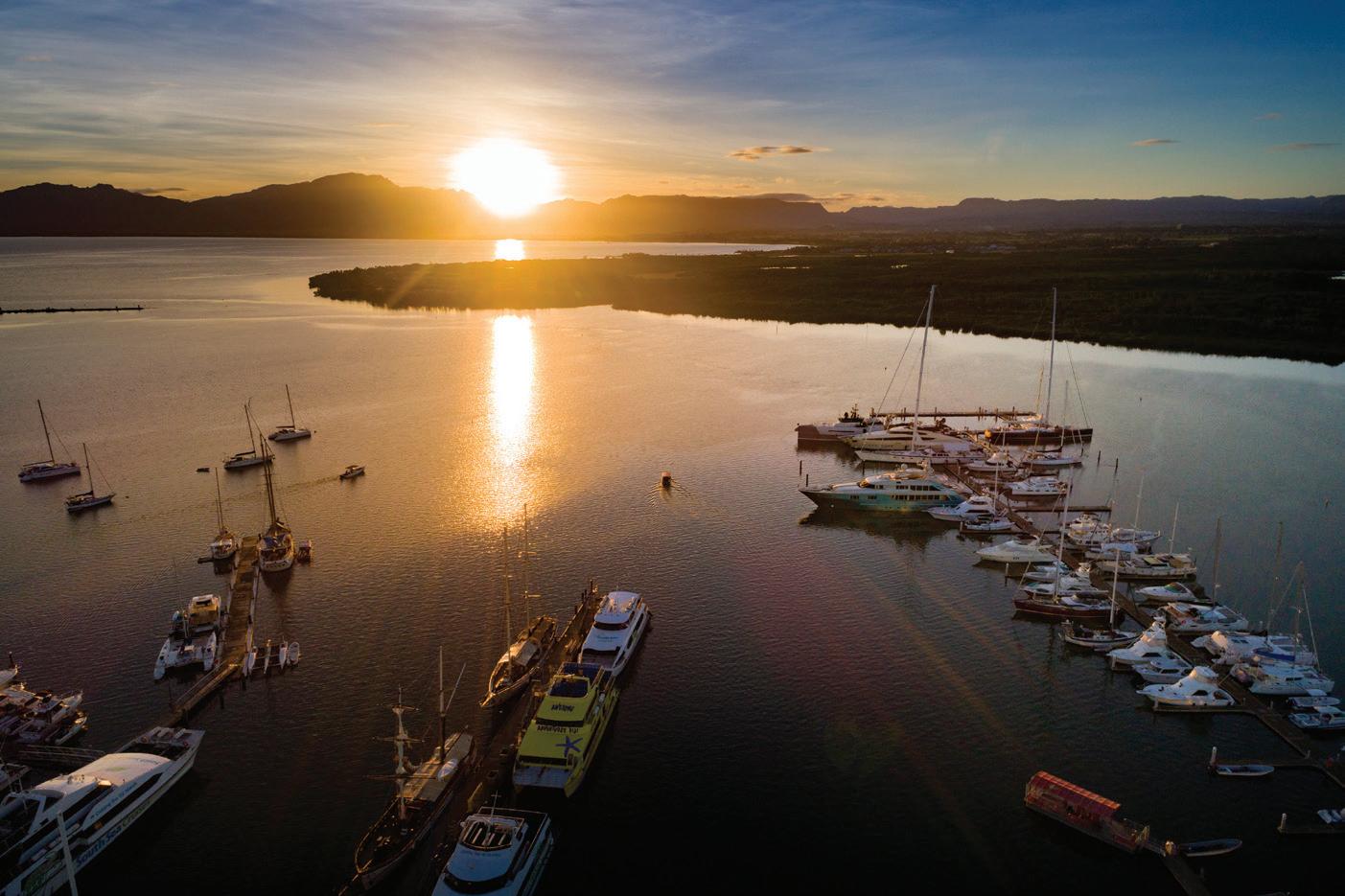
Industry bodies
BPO (Business Process Outsourcing) Council outsourcefiji.com
Fiji Commerce & Employers Federation fcef.com.fj
Fiji Hotels and Tourism Association fhta.com.fj
Government
Portal for business-related government permits and applications businessnow.gov.fj
Fiji Government Portal fiji.gov.fj/Home
Investment Fiji investmentfiji.org.fj
Tourism Fiji fiji.travel
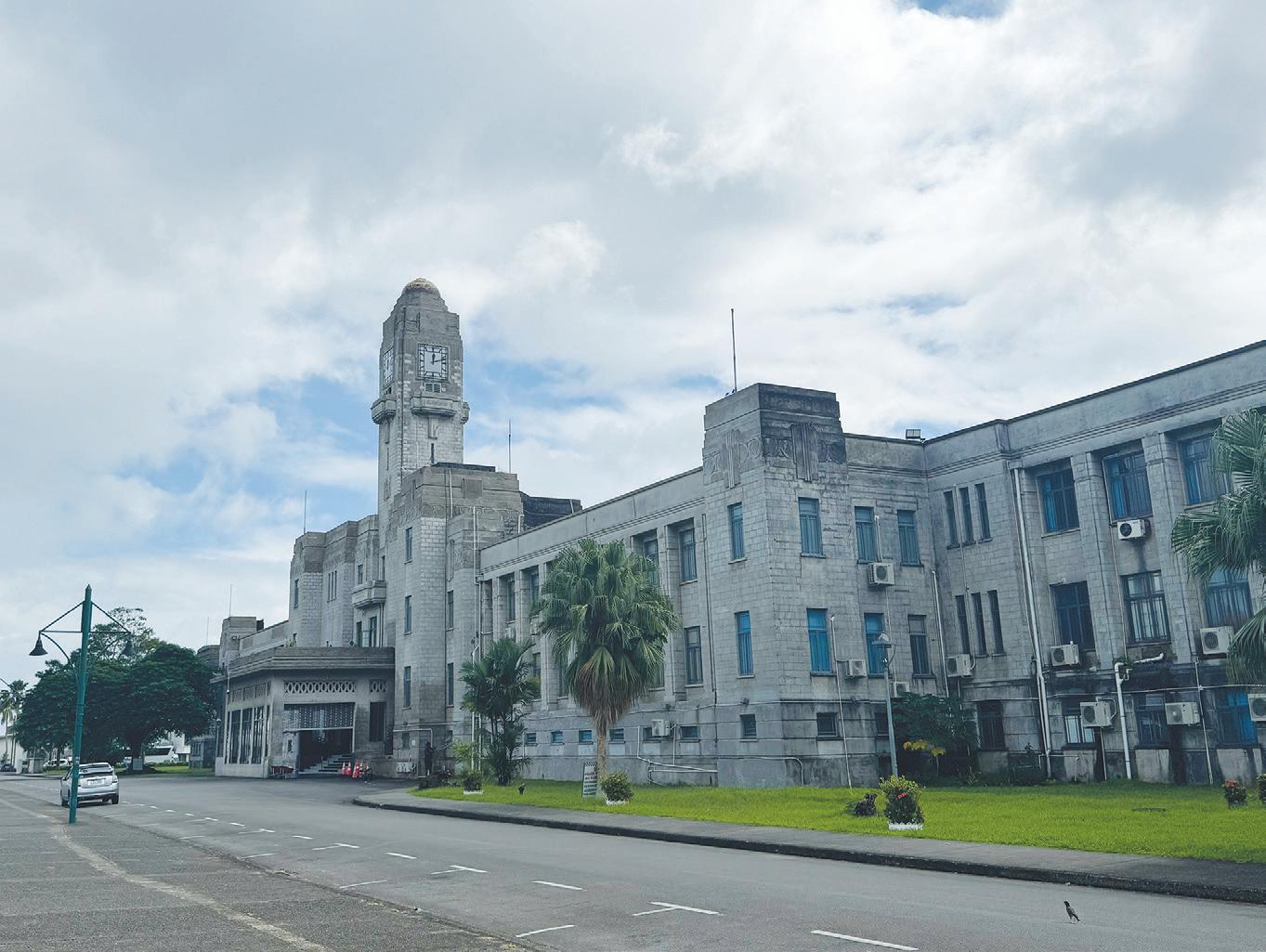

Aspen Medical is delivering world-class healthcare services to the people of Fiji
In partnership with the Fijian Government, we’re leading the transformation of public healthcare at Ba Hospital and Lautoka Hospital.
Currently, Lautoka Hospital is undergoing a transformative $11 million upgrade, featuring a state-of-the-art Cath Lab, an advanced MRI suite and a modernised emergency department. This phase will be fully completed by 30 June 2025.
These enhancements underscore a dedicated commitment to providing world-class medical services in the Western Division.

